#carl jung four archetypes
Text
The Archetypes of Manliness | The Art of Manliness
4 notes
·
View notes
Text
The idea of the twelve character archetypes was suggested by the Swiss psychiatrist Carl Jung. His theory on basic human personalities suggests that each human is led predominantly by one of four motivations during their lifespan, split into three separate character traits. These archetypes are now often used by writers as a basis for their characters.
The "Provide Structure" trait includes:
The Caregiver
The Creator
The Ruler
The "Spiritual Journey" trait includes:
The Innocent
The Explorer
The Sage
The "Leave a Mark" trait includes:
The Hero
The Outlaw
The Magician
The "Connect With Others" trait includes:
The Everyman
The Lover
The Jester
#writers#creative writing#writing#writing community#writers of tumblr#creative writers#writing inspiration#writeblr#writerblr#writing tips#writblr#quick writing tips#writing help#writing resources#writing advice#writing tips and tricks#character development#character archetypes#writing characters#writing reference#advice for writers#learn to write#help for writers#helping writers#let's write
785 notes
·
View notes
Note
Hello👋
Do you have an opinion or analysis of Johan from Yu-Gi-Oh GX?
I love his Character💕
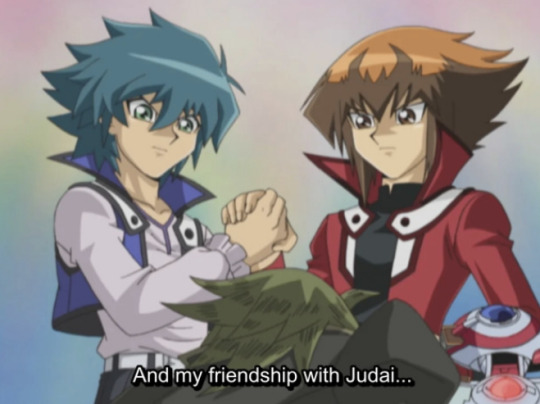
My opinion on Johan is I love him lots. The only reason I didn't include him on my previous season 3 posts is that there's so much to talk about with Johan he basically requires his own post. Johan is just as important to Judai's development in season 3 as Yubel, both alchemically and thematically.
So let's embark on another long, long post for Johan and his role in the story.
The Golden Shadow
Before we deep dive into alchemy let's talk about Jung. Jung's theories of analytical psychology is heavily based on Alchemy so this is relevant, I promise. Freud and his contemporary Jung both pioneered the field of psychology together, however Jung went deeper and believed that re-occuring character archetypes and motifs in stories told us something about the human subconscious itself.
For Carl Cung, "the rediscovery of the principles of alchemy came to be an important part of my work as a pioneer of psychology". Jung linked the steps of alchemy several a process of turning lead into gold as a metaphor for individuation.
Individuation is essentially becoming one's self. Jung believed for a person to be whole, they had to integrate all the parts of their personality. His model divided personality into the the persona (the face / exteral world) shadow (the internal / the subcosnscious where everything's hidden), and the anima and animus made of feminine and masculine traits.
In a show like Yu-Gi-Oh GX, individuation is the process of growing up. Jung used alchemy as a metaphor for a developing person's ego maturing, each stage representing a different aspect of his divided conscious. Nigredo is where we become aware of our shadows, Albedo refers to the anima and animus, citrinatis is where sophia the wise old man or women appears, and rubedo is where the self becomes whole.
Johan however, represents two concepts I've left out. Sometimes alchemy is not four stages, but rather five.
The fifth stage is the Peacock's tail, which appears when a person receives a flash of inspiration. Unlike other stages of alchemy associated with color, Peacock's Tail is referred to as the prismatic stage, associated with the colors of the rainbow. The connection to Johan who's signature card is the Rainbow Dragon is obvious.
More on the prismatic phase in the second half of this power however. For now all you need to know that like the star card in Tarot, Johan is a dazzling light of inspiration that helps kickstart Judai's development. The way he does this is by giving Judai someone to aspire to be like.
If the process of aclhemy is to create gold and become your best self then Johan is the golden shadow, to Judai. His role in the story is to help guide Judai into being his best self.
While the shadow is made up of parts of ourselves we hide from others, sometimes these are positive qualities. For example, a character with low self-esteem like Sho Marufuji constantly put himself down and therefore he's never able to see his good qualities because all he ever focuses on is how he's lackluster in comparison to his brother.
If Yubel represents the worst of Judai's flaws that he must learn to accept so he can learn to love himself in spite of those flaws, Johan represents the best in Judai. While Judai has many flaws that are glossed over in the first two parts of the show, I'd also argue he doesn't experience any positive growth. He's entirely stagnant as a character, which is why I say the opening to season 3 and the immediate introduction of Johan is what kickstarts his development.
The banner image I used for this post is where Judai and Johan are doing the Yu-Jo pose, a card in the TCG that is a reference to the friendship between Yugi and Joey in the original series.
However, I would argue that their roles are flipped. In spite of being the main character Judai is Joey, and Johan is Yugi. It's Yugi who makes Judai develop into both a better friend and duelist as a result of their friendship, to the point where Judai almost became too codependent on him and had to learn to separate himself from Yugi and develop on his own in Battle City arc.
(Hint hint, Judai and Johan will follow almost this exact same arc).
Yugi is the light which guides Joey into betterig himself, and Johan is the light that guides Judai.
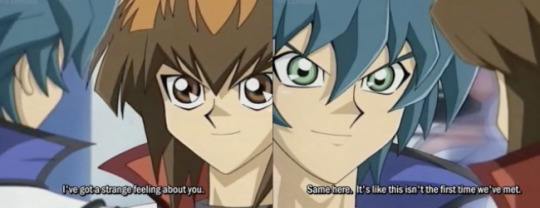
Judai and Johan from their first meeting, get the vague sense they've already met before. Since this is Yu-Gi-Oh the immediate assumptio would be they had some kind of relationship in a past life, but plot twist it's Yubel.
However, I think this red herring is still important because despite the constant comparisons Johan is more similar to Yubel, then they are to Judai.
Edo refers to them both as Duel-Bakas, Shou gets jealous that Judai and Johan spend constant time together after meeting, in everyone else's even probably Judai's they're the same but if you look at their actions as audience members they're quite different. The comparison between them shows the many ways in which Judai is lacking.
Johan is basically Judai, but better. Judai is put on a pedestal by all his friends and seen as a classic hot-blooded shonen protagonist. Johan however, is the one who has all the classic traits of a real shonen protagonist, including having a dream to aspire to, and also fighting to protect his friends.
These are the two most important traits established from basically the first episode with Johan.
Strong bonds
A reason to fight
Johan's personality is more complicated than that, but these two traits are the most important because they're things Judai is lacking in.
Judai is someone is defined by his friendless background, and had no friends until his first year of Duel Academy. Which is why it makes perfect sense that while Judai is in love with the idea of having friends, he doesn't quite understand what a healthy friendship looks like. Judai is also someone who lacks a reason for dueling and only cites he does it for fun and his own personal satisfaction.
Arguably Judai is forced into duels with greater stakes in seasons 1 and 2, but the key word there is forced. Judai is always pushed into those situations, either because his friends aren't strong enough to duel, or his friends actively expect them to fight their battles in their personal lives for him (cough, cough, Sho). In other words he duels for two reasons, either personal satisfaction, or carrying the burdens of others because that's the way he keeps his friends around him.
Judai is ruthlessly criticized for both of these in season 3, the stakes of dueling become too high and Judai just crumbles under the pressure of having to duel for everyone else. As a result his friendships which were never that stable to begin with fall apart.
Johan on the other hand has a goal on his own, and while he might be a tad overprotective of Judai he's also able to coordinate with the rest of the group. In fact when the whole school is teleported to the other dimmension, it's Johan who steps up to lead, while if you notice Judai's actions he splits off from the group repeatedly. Johan's actions are also the reason they are able to return home, because Judai was unable to do anything substantial to defeat Yubel.
One of Johan's first interactions with Judai is him pointing out how callous Judai can be towards his friend, something which others would usually brush aside.
Sho: Bro… I thought you would have something to say to me.
Johan: He seems lost. I think he just wanted you to give him some advice.
Judai: Sho will be fine.
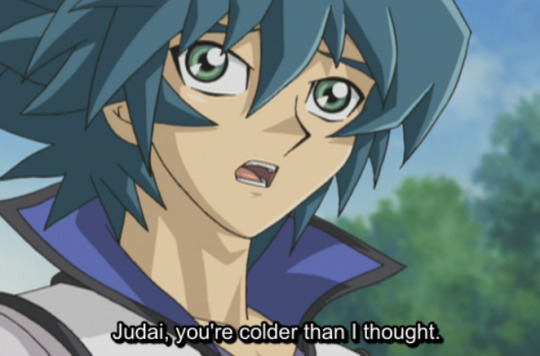
More importantly Joha can notice these flaws about Judai and immediately point them out and confront them about him, while still remaining friends with him on the whole.
Johan is Judai's model for a positive friendship. In comparison the friendships he has with other people crumble because of inability for both sides to communicate.
When Judai and his friends travel together to another dimmesion, Judai is selfish in constantly disregarding others feelings and running ahead, and at points even lying to them and going against plans they all made together. However, Judai's friends are unable to confront him about these issues and instead mostly talk and complain among themselves behind his back. Judai might not have listened in his state of mind, but they don't even make the attempt.
In fact the friends who do try to confront Judai about his behavior are August and Jim, characters Judai has known just about as long as Johan in comparison to friends he's had for two years who don't feel comfortable having a basic confrontation with him.
Judai's friendships suffer from the fact that none of them are truly equal. Sho for example is the first person Judai meets on the island and the one who he's known the longest, but one of their first interactions is Judai expressig discomfort for the fact Sho calls him his older brother because he wants duelist to be equals and Sho just ignoring him and continuing to call him that.
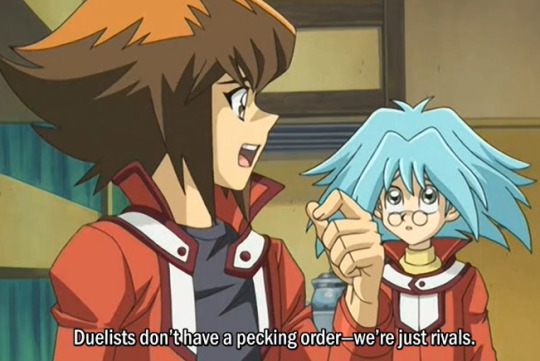
Once again I believe there is problems on both ends, Judai is very selfish and has a tendency to be ignorant of other people's feelings. On the other hand, Judai's friends eventually get in the habit of expecting him to solve their problems because they've built up the idea of him in their minds as the group hero.
As I said the friendship crumbles from both ends in season 3, part of it is Judai being selfish and acting like he's the only person that matters, part of it is his friends ruthlessly criticizing him because he's failing to live up to the image they've constructed for themselves.
Judai's friendships are fundamentally unequal but Judai himself isn't aware of this because he has no idea what a healthy friendship looks like - until he meets Johan.
Johan is a character not introduced to us in season 3, and yet it's very understandable to the audience that Judai would become so obsessed with saving someone he's known for about a month, to the point where he risks the lives of friends he's known for two years. Because that month has given Judai his first taste of what true friendship is like, rather than the idea of friendship he's been chasing.
Johan is Judai's better half in a lot of ways. One example we're introduced to immediately upon his introduction is Johan's role as someone able to see duel spirits, and his strong relationship with his cards. Just as an example, all of Johan's cards regularly talk to him and Johan even refers to them as the closest thing he has to family.
Judai until that point had a spirit partner that doesn't talk, and his heroes and neo-spacians are more like allies. For Judai the Neo-Spacians are allies in his fight against the Light of Destructio, for Johan the Crystal Beasts are his family.
Johan is also far more experienced as someone who can see duel spirits, while Judai is actively repressing the memory of the fact he could see spirits much earlier in life, and of Yubel.
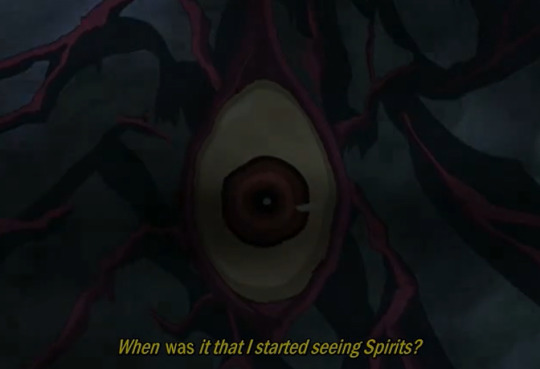
Before the characters even travel to another dimmension, Johans duel against the spirit hunter Giesse demonstrates how Judai is lacking in these two traits, strong bonds, and a reason to fight. It also demonstrates the difference between how Judai and Johan regard their spirit partners, and why Johan's relationship with his cards is better.
Shortly before the duel even begins Judai is pushed to the brink by his previous duel against the teacher. A duel that not only exhausted him, but also deeply disturbed him because the teacher called into question his lack of reason for dueling and Judai had no real response. When Judai questions himself he does something we don't often see him do, he goes to someone else for advice. J
udai basically never lets himself appear insecure or lost around friends who aren't named Johan. Judai even apologizes to Johan for asking something out of the blue, he's so unused to relying on others for emotional support of any kind.
Judai: Johan what have you been dueling for? See, it's about fun for me... Well, for the surprise and happiness too. I guess I do do it for the fun. Sorry, I guess I put you on the spot by asking out of nowhere.
Johan: What's this about Judai?
Judai: It's nothing.
Johan: I suppose there is one goal I have.
Johan: Even if someone doesn't have the power to see spirits, they can still form a bond with a spirit. That's why I do it for people like him.
Johan wants to be a bridge between humans and spirits. Not only is Johan a character defined by the strong bonds of friendship he forms, but his life's goal is also built around improving the bond between spirits ad humans.
Immediately afterwards, Judai gets up and struggles to duel against their next foe. However, this time Johan steps up to duel in Judai's place, which is also a drastic change from Judai's other friends. Unless they had a strong personal bond like Fubuki and Sho with Ryo, Judai has stepped up to handle all the major duels since Season 2. Judai even experiences anxiety over letting Johan go and duel in his place.
Johan is introduced to Giess the hunter, a spirit hunter who actively found a way to kill spirits. A character like that seems like Johan's obvious narrative foil. Giess even invites the comparison between the two of them, saying that Johan is obsession with getting his hands on Rainbow Dragon is similar to how he hunts spirits.
However, Giess works much better as a negative foil, or shadow of Judai. Which is why it makes sense Johan is the one who duels him, because he represents the best in Judai while Giess represents the worst.
Now the question is how could Giess possibly be compared to Judai? Yes, as I demonstrated above Judai is much more inexperienced with seeing spirits than Johan is but he's never actively malicious towards them the way Giess is.
Except, you know when he slaughters hundreds of duel spirits after turning into Haou the Supreme King.
Giesse has a final monologue upon his defeat, to explain why he does what he does and his cruelty towards spirits. Giesse who has probably been able to see spirits as long as Johan once formed a strong bond with a duel spirit, but he was separated from that spirit. The pain made him close his heart off to forming bonds with any other spirits.
After losing his duel spirit partner he came to conclude it was impossible for humans and duel spirits to get along, because the spirits are too pure hearted to understand humans.
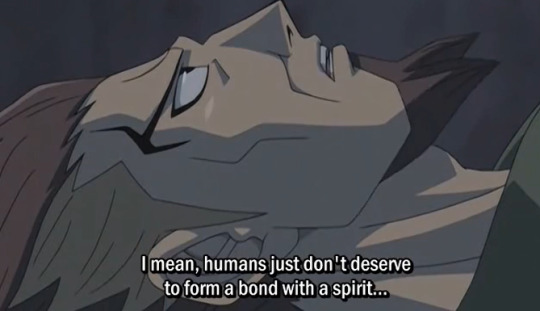
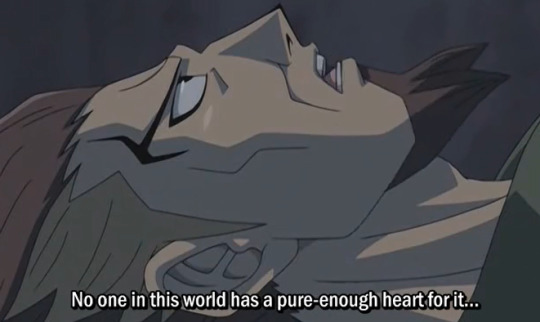
Giesse foreshadows Judai's downfall and his actions as the supreme king. Giesse's start of darkness was being forcibly separated from his spirit partner. The entire conflict from Season 3 happens because Judai made the choice to send his childhood friend / spirit partner Yubel into space.
Ironically, despite Yubel beig corrupted by a force called the Light of Destruction, and having a very twisted, sadomasochistic view of love I think Giesse's words here describe why Judai and Yubel can't understand each other.
Yubel is in a way too pure hearted.
We're never given a reason why Yubel became so overprotective of Judai in childhood before they ever became corrupted by the Light of Destruction but we know one thing for sure.
Yubel has no understanding what they did was wrong. They saw themselves as doing their job of protecting Judai which they sacrificed their body for in the past life. They neither understand why Judai was upset by their actions, or why Judai was upset when people started avoiding him because for Yubel being alone with Judai was enough for them.
It makes sense that Yubel wouldn't understand that Judai wants to have friendships with other children his own age. After all Yubel is a spirit that can only be seen by Judai. For Yubel, there is only Judai, they can't communicate with others, they can't form other friendships. Which is extra tragic if you remember that Yubel wasn't born a duel spirit but a personhood, and gave up their very personhood for Judai.
Yubel is very pure-hearted in a way that's almost insidious, they are so straightforward about their love for Judai, and they exist solely for Judai's sake that they can't understand why Judai has room for other people in his life, because there's no one else for Yubel.
The conflict in season 3 comes from Judai's decision to abandon Yubel. Judai can't come to an understanding with Yubel because Yubel is too pure, being a duel spirit that only exists for Judai's sake.
Judai also follows a similiar path to Giesse, when he loses Johan along with the rest of his friends Judai makes the decision to give up on the notion of love in order to gain power instead.
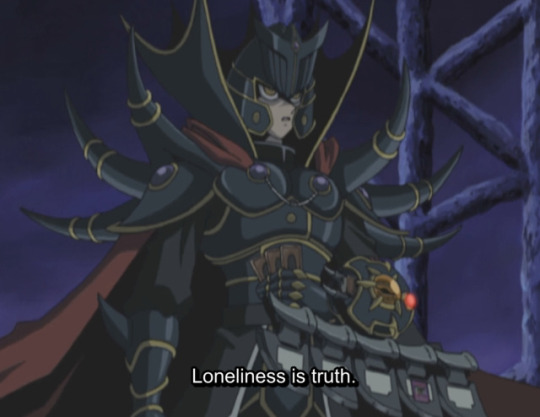
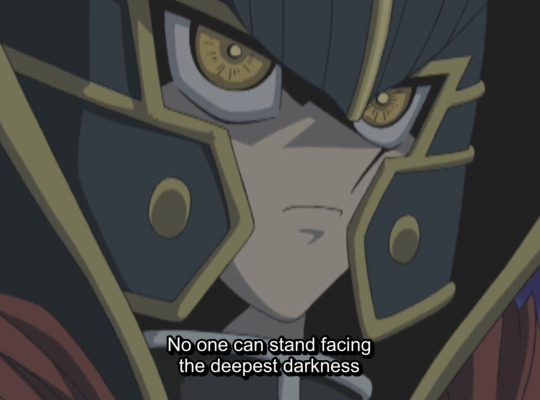
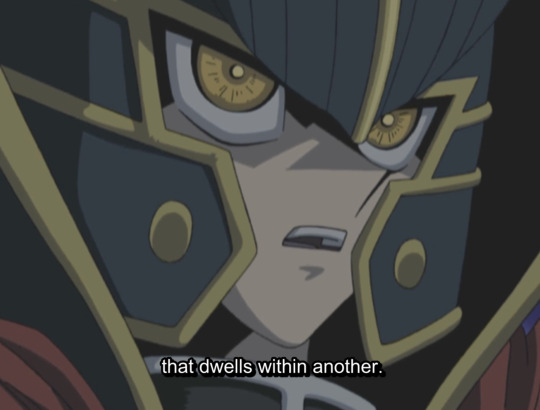
This is quickly followed by him killing duel spirits en masse, probably more than Giesse managed to kill in order to sacrifice them to forge a powerful card. When Johan is battling with Giesse he's literally battling a reflection of the worst part of Judai. Which sets up Johan's role in the series to guide him to his best self.
In summary Johan's relationships with his spirits are strong and healthy, Judai's relationships with Yubel is weak and unhealthy. In fact, Judai is helping achieve his dream of being the bridge between humans and spirits by essentially teaching Judai what strong bonds looks like.
Johan is also symbolically Judai's complementary half in a lot of ways. Each of the new transfer students plays a deck that embodies one elemental step of the stage of alchemy, August is fire / Nigredo, Amon is Water / Albedo, and James Crocodile Crook is Earth / Citrinitas. Johan is the only exception to this rule, because he plays the crystal beasts which are modeled after the seven colors of the rainbow.
Johan is light which puts him into the contrast with Judai who's both set up as the chosen one of the "gentle darkess" to fight the light of destruction, while at the same time someone corrupted by that very darkness into becoming Haou.
Which sets up Johan to contrast to be a pair with Judai. My friend Kaula or @nini-the-mirror pointed out to me we're shown two types of darkness, the destructive darkness embodied by nightshroud and the gentle darkness. While the light of destruction is set up as a destructive force in the universe, there's also Johan's light based crytal beasts, and rainbow dragon which cleanses away darkness. Fusing Rainbow Dragon with Neos purged Yubel from Johan's body, and when Judai was trapped in darkness illusion in Domino City and believed Johan to be Mr. T, it's Johan and the Crystal Beasts who purify him once again.
Johan's desire to be a bridge between spirits and humans, his northern heritage, and Rainbow Dragon all call to mind the Bifrost, a rainbow bridge which connected heaven ad earth.
The bifrost was a connection between the mortal world, and the realm of the gods, or the physical and the spiritual. Just as Johan is a mortal who can talk to spirits. Yu-Gi-Oh GX is also an anime heavily based off of alchemy concepts, and one of the central ones that's even said by Professor Daitokuji himself is: That which is above is like to that which is below, and that which is below is like to that which is above.
It's a phrase written on the Emerald Tablet, often shortened to "As above, so below." It means the mortal world effects the world of the cosmos, and the world of the cosmos effects the mortal world because everything is connected.
By wanting to stregthen the bonds between humans to spirits Johan is basically embodying this phrase. Judai's goal as the alchemist is to be the one to make changes in the mortal world that affect the cosmos. For example, his battles on earth against Saiou has a direct effect on stopping the Light of Destruction, but honestly again Johan serves his role a lot better than Judai.
Johan is in fact a character written around the concepts of bonds itself, the bonds of humans, the bonds between friends. Judai cares about these things too, he wants to be a good friend, but he has lots of flaws that stunts his growth and holds him back. His inability to integrate his shadow also presents him from being his best self (the golden shadow).
To quote my friend Psyche:
"The shadow is basically the storehouse of everything you don’t like about yourself. The things that others are but you could never allow yourself to be. But it’s also the storehouse of the alchemical gold."
Not only is Johan the best parts of Judai by being his golden shadow, he's also essentially Judai's goal. Judai wants to be like Johan.
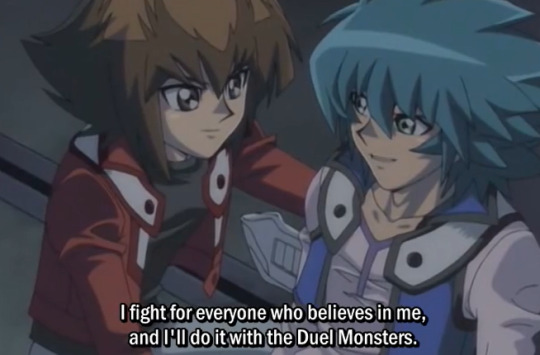
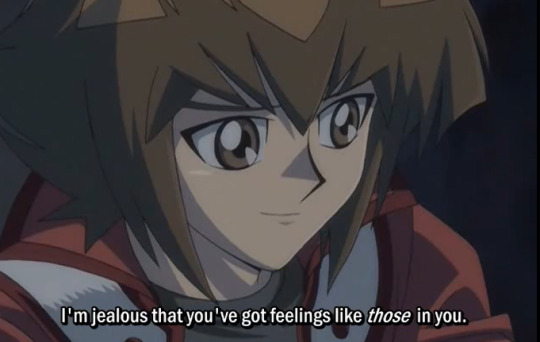
If Johan gives Judai these things he's lacking, a healthy friendship, and a reason for fighting, then problem solved right? All Judai needs to do is marry Johan.
If you can't tell I was being sarcastic.
The Prismatic Phase
Alchemy is a process of refinement, of breaking down and forging into something stronger. However, when the metal starts out it's full of impurities that need to be hammered out. Alchemy is often used as a metaphor for both character growth and developing relationships in stories, after all if a character starts out perfect there's no story.
I said above multiple times Johan exists to demonstrate to Judai what a healthy friendship is to Judai. However, the attachment that Judai forms with Johan is anything but. Albeit for different reasons than the rest of his friends.
Johan is indeed someone who is set up as Judai's equal, and also strives to be his support rather than constantly relying on him for battles. Johan doesn't just exist to be a good friend to Judai however, he also demonstrates leadership skills Judai doesn't have when faced with a school full of hungry students teleported to another dimensions.
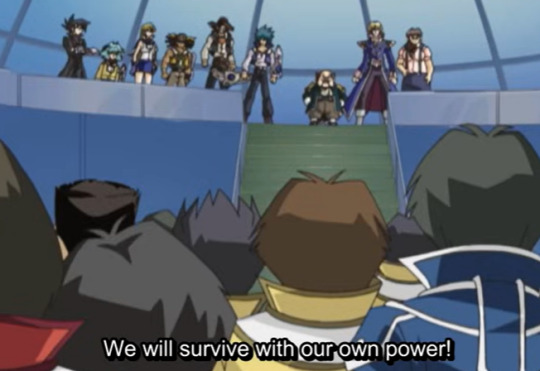
The problem is on Judai's end. Judai definitely needed a friend like Johan, because he's never experienced a friendship between equals before. However Judai as inexperienced as friendship as he is takes this openly supportive friend and starts using him as a crutch.
There's one scene in particular that demonstrates this problem. In the leadup to the cobra duel, Judai confided in Johan twice that he doesn't have any real reason for dueling and he's insecure about that fact. Cobra then criticizes Judai heavily once again for his irresponsible attitude.
Seeing Judai about to crack under the pressure, Johan takes the moment to encourage Judai by reminding him that he has in fact been carrying everyone's responsibilities on his shoulders all along.
Johan: "Why are you so scared Judai? You think there's nothing riding on you? Quit messing around. You've always had everyone's hopes on you. Anyone who's being counted on'll have people putting all their hopes on him. Isn't that what you're always burdened with. What will happen to us all if you lose?"
Well-meaning advice from Johan, but wrong for Judai for two reasons. The first is that Judai's reasons for fighting are something he has to think through for himself. That's how character development happens. Judai can't solve this inner conflict by having Johan just show up and drop the answer in his lap. He still hasn't thought about what he wants to be, he's just accepted Johan's words at face value.
The second is that Judai taking on other people's burdens is precisely the problem. Johan is such a self-reliant person he can give his support to other people without tiring himself out, but Judai can't. Johan wants to protect his friends. Judai duels for his friends because he's absolutely terrified of losing his friends, that's the difference.
Judai's not mature enough to handle other people's burdens and eventually the pressure gets to him and he completely cracks. Judai's just not mature enough to have a healthy relationship with Johan in general.
A relationship where being separated causes one person to have a complete emotional breakdown is not a healthy relationship.
In fact Judai completely ignoring all of his friends after a separating from Judai, and wanting to get him back ad being willing to sacrifice anything for that goal is a parallel to Yubel. Yubel is also someone who was separated from their best friend who they emotionally depended on, and stopped caring about anything but said friend, and was willing to sacrifice everything to reunite with them.
You could liken the disappearance of Johan, and the subsequent rising of Judai as the Supreme King as propelling him through the black phase of alchemy Nigredo, where the soul is brought to its lowest point and the worst flaws are revealed.
In the second sense, "the nigredo of the process of individuation on the other hand is a subjectively experienced process brought about by the subject's painful, growing awareness of his shadow aspects. It could be described as a moment of maximum despair, that is a prerequisite to personal development Here is "the darkest time, the time of despair, disillusionment, envious attacks...Nigredo, the blackening" [Source]
Johan's friendship is important to Judai, but his union with Johan doesn't actually fix any of Judai's problems and aggravates them in some ways. Judai doesn't even start improving as a character until after they seperate.
Johan isn't the rubedo the end result of alchemy, he's the pristmatic phase, the shining light of inspiration.
One metaphor I like to use for the Prismatic phase is the Star in the fool's journey. GX references Tarot and the fool's journey too, and like alchemy it's also a metaphor for personal growth. The fool (Judai) a person brimming with infinite potential, yet one who is also supremely ignorant, walking forward blind has to wise up to the wys of the world.
In the Fool's Journey the Star is a period of brief respite after the disaster of the tower. A beacon of hope and inspiration appears before him.
The Fool is suffused with a serene calm. The beautiful images on the Star (17) attest to this tranquility.Radiant stars shine in a cloudless sky serving as a beacon of hope and inspiration.
The Fool is blessed with a trust that completely replaces the negative energies of the Devil. His faith in himself and the future is restored.
Doesn't this just describe Judai and Johan's first meeting to a T? Johan is supposed to be Judai's guiding light in the story ater all. However, the Star is immediately proceeded by the moon the card of illusions and self doubt.
Just like Judai becomes too reliant on Johan to provide him all the answers, the light of the star makes the fool vulnerable to the illusions of the moon.
What effect could spoil this perfect calm? Is there another challenge for the Fool? In fact, it is his bliss that makes him vulnerable to the illusions of the Moon (18). The Fool's joy is a feeling state. His positive emotions are not yet subject to mental clarity. In his dreamy condition, the Fool is susceptible to fantasy, distortion and a false picture of the truth.
Season 4 even invokes star and moon symbolism in regards to Judai and Johan in a negative light. Fujiwara looking into Johan's heart says that Johan's weakness is Judai himself.
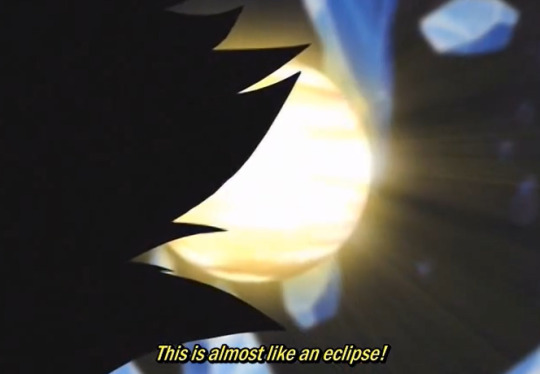
He describes Johan's friendship and fixation on Judai as a moon eclipsing the sun. That's not two opposites balancing each other out that's one obscuring the other.
The season 3 version of their relationship is unhealthy and therefore needs to be broken apart and reformed. That's the process of alchemy, even if Yubel didn't kidnap Johan they probably would have broken apart some other way because Judai was too dependent on Johan.
It's also a violent process that includes Judai needing to duel Johan in a way where they are both inflicting pain on each other in order to purify Johan of Yubel's control. Yubel and Fujiwara both comment that underneath it all Johan desires a violent conflict with Judai. Which is probably something that would be explored more if Season 4 was longer. My interpretation however is that Johan being who he is, is kind of forced into the role of caretaker when Judai is involved as Judai is often in need of taking care of. That probably produces darker feelings for a change in their relationship.
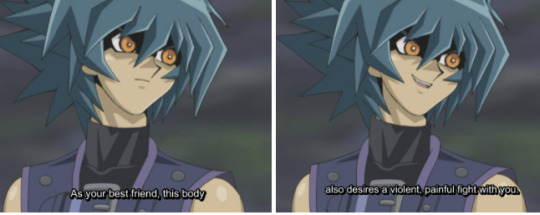
The opposite of unions is a violent process that requires dissolving your previous self. The dictionary of Alchemical Imagery defines it as-
one of the central images of the opus alchymicum and a crucial operation in the creation of the philosopher’s stone. The alchemists were ultimately concerned with the union of substances, the reconciliation of opposites. Through the ‘marriage’ of opposites the goal of the opus, the production of gold and its metaphysical equivalent was obtained. (p. 35)
Judai doesn't marry Johan, but they do have their friendship broken apart and reforged again and it's representative of the prismatic stage.
The Peacock's tail which Johan represents is also like the Star in tarot, a stage where a guiding light suddenly appears. One of the Spector Solis plates , Plate 16 - which depictins a Peacock in a flask is a good representation of this stage.
It is a plate of what else but unity.
The unity that began in plate fifteen is fully realized with the encapsulated animal’s transformation into a single-headed being. The peacock tail is a physical stage in alchemy, a brilliant flash of green which comes to signify that the alchemist is one the right path. It can also be recognized in spiritual/psychological alchemy as a flash of visions that come to the adept as they move through the phases of transformation.
The peacock doesn't just appear to guide the young alchemist through the phases of alchemy however, he also guides them spiritually.
Plate sixteen embodies that process, the turning point where the adept reaches a new level of consciousness with a flash of the peacock’s tail.
Consider the words spirit (i.e., the wine), spiritual, and inspiration.
To inspire can mean to breath; it can also mean to transmit fervor. Spirit can be meditative, or evocative.
Who better to provide spiritual guidance to Judai then the person who's goal in life is to become the bridge between humans and spirits.
As the star's dazzling moment of inspiration is just temporary, the plate also emphasizes that the peacock's tail itself isn't the ed of the journey. One of the most significant symbols on the painting is the appearance of three people drinking wine and eating grapes. Three people = three stages of alchemy. As for the rest.
The key to the process of plate sixteen lies in the bottom left-hand corner, with the three people seated at a table, drinking wine and eating grapes. The process of this plate is fermentation. Grapes must be crushed and destroyed to create sweet intoxicating wine. The grapes are perfect as they are, but by destroying them we can make something higher, something that can alter consciousness.
Judai has a nice, comfortable, supportive friedship with Johan but he's the one receiving most of the support. By destroying that relationship, he's able to make a healthier one. Ironically it's the separation from Johan that teaches Judai how to exist apart from him.
In that sense Judai's character development revolves around two figures in season 3, two important relationships, Judai needs toto reunite with Yubel, and he needs to separate from Johan after quickly becoming too codependent.
The three of them together even form an alchemical trio. Often works featuring alchemy symbolism will divide characters into three different roles, the soul (anima), the spirit (spiritus) and the body (corpus). Symbolic of three parts of one whole person. The main characters of a work are often symbolically marked as one of the three.
The classic symbolism of alchemy is the circle, the triangle representing soul spirit and body, the square that repreents the four elements, the small circle, and the man and woman which form the rebis.
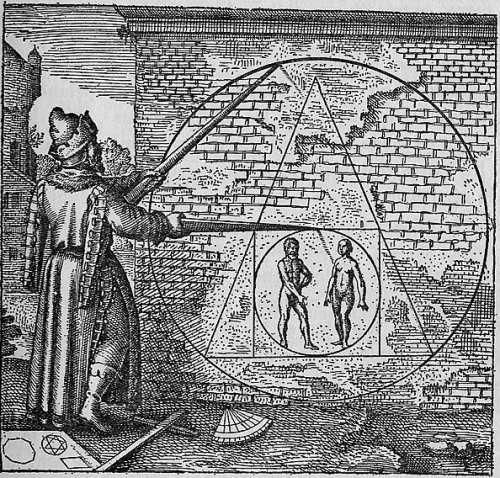
The triangle is what we're talking about here, in terms of marking characters to Soul, Spirit and Body. Though, another variation is Mind, Heart, and Body.
Most commonly, authors mark their male protagonist, the Male Principle of the Work, as heart and their female protagonist, the Female Principle of the Work, as mind. If they have a companion, he or it will be marked as Body. If you look back at the Mundus Elementaris that I just posted you’ll see that Sun corresponds to Cor (heart) and Moon to Cerebrum (brain).
The characteristics of a “heart” character are pretty much what you’d expect: courage, self-sacrifice, occasional rashness and impulsivity.
The characteristics of a “mind” character are if anything even more obvious. “Mind” characters are knowledgeable, book-smart, and sometimes overly cautious.
What about the Body character? There isn’t one in every alchemy story, but when this does appear, the markers are predictable. Body characters are focused on their bodily needs–they are hungry, thirsty, and, in adult stories, lusty. And they are often fearful. [SOURCE]
In this case in a slight difference from the norm, I'd argue that Judai is the heart, Yubel is the mind, and rather than body Johan represents spirit.
The three of them essentially make up the trio of Judai's two most important relationships. Judai is a part of other groups, because GX has a ensemble cast. In seasons 1 and 2 he mainly hangs out in a trio of Sho, Hayato and him, and in season 2 it's Sho, Kenzan and him. Season 4 kinds of marks Judai, Asuka, Sho and Manjoume as the most important students of the graduating class.
However, the characters that influence Judai the most are Yubel and Johan. Johan is the spiritual ispiration, while Yubel is first a challenge for Judai to wise up and grow up, and eventually settles down into a role of advisor like Astral or Yami Yugi.
The main character trio of Season 3 onward are essentially Judai, Johan and Yubel, and each are critical to each other's growth. All three also participate in the final duel against season 3's villain. Judai and Johan tag team darkness possessed Fujiwara, and Judai and Yubel fight nightshroud.
However, as I mentioned above the way these relationships develop Judai are opposites, one of them needs to unite, the other needs to split.
A lot of people draw parallels to Yubel and Ai, the ally turned final villain of Vrains. Ai is also motivated by love and a desire to protect Yusaku the main character and object of their affections. However, the greatest point of comparison is that the option of fusing themselves together, an obvious call back to super polymerization is brought up by Ai in order to be flatly turned down by Yusaku.
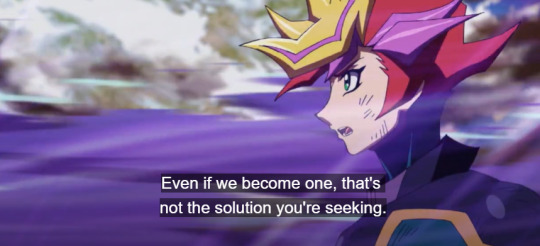
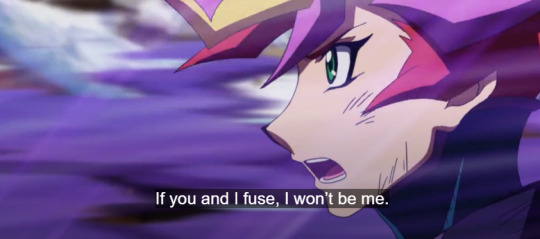
And you won't be you.
The parallel to Judai and Johan is not as obvious here, but think about it Judai is his absolute worst self when he's willing to sacrifice anything just for the chance of having Johan back
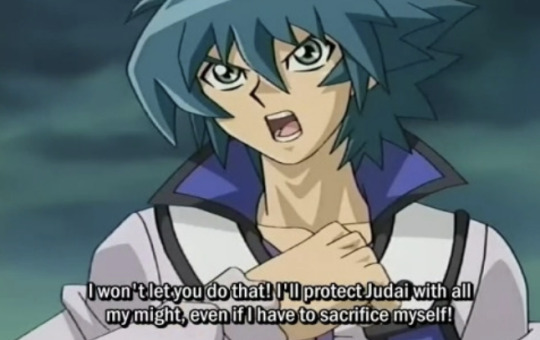
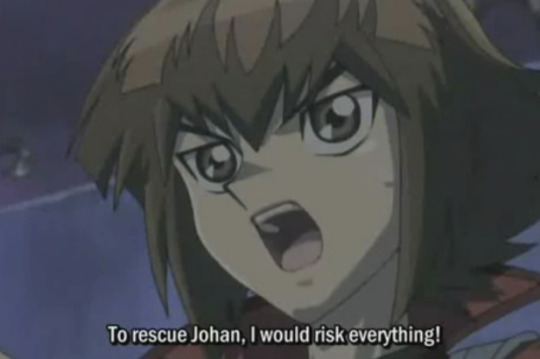
Okay but just look at how different the two are. Both Johan and Judai, when put in very similar situations (having to save someone), tell us what they’re willing to risk for that goal. They’re both very clear about that.
Johan is willing to risk himself.
Judai is willing to risk everything else. [Source]
Judai become so destructive in his path to get Johan back, including slaughterig duel spirits en masse, somethig the self appointed protect of duel spirits Johan would absolutely hate that you have to wonder if his desire to have Johan back is even about Johan.
Judai doesn't have much respect for Johan's agency as an individual. It's normal for Judai to be sad, or even to have survivor's guilt when he thinks Johan is dead because he sacrificed his life to save him.
However, Johan didn't sacrifice his life to save just Judai but everyone else. Johan also made the choice to sacrifice himself so Judai would be safe. Judai's response to that choice is to immediately throw not only himself but his friends into repeated danger in order to rescue Johan, and then when all hope is lost start hurting spirits.
Judai doesn't respect fact that Johan wouldn't be happy with Judai hurtig himself or others, especially spirits, because rescuing Johan was never about Johan, but Judai's own feelings of grief.
Juudai is a deeply flawed protagonist. He’s more selfish than any other protagonist this franchise has ever known. The way he goes after both after Johan in season three and O’Brien shows that he actually doesn’t care all that much for them as people. To him, they represent a concept: Victory, or at the very least atonement for his past actions. A convenient way to right what he did wrong.
That is not to say that he doesn’t like them as people - he does. But when the chips are down, what he ultimately wanted was a chance to redeem himself by saving them. [Source]
Yubel and Judai are opposites who need to be united and learn to live with each other. The crux of Judai and Johan's problem is that really they're so similiar that everyone, including Judai sort of sees them as the same perso. However, as stated above just underneath the surface they have a lot of differences that could lead them to an unhealthy relationship. Judai just like Ai needs to learn that Johan is a separate person from him.
Which is why Judai's greatest two character development moments with Johan come not from the moment where he fuses rainbow dragon with Neos for the first time to cleanse Judai's body from Yubel.
It's actually immediately afterwards, when Johan hands Judai his deck to face Yubel. While Judai also makes the decision to face Yubel alone.
The arc theoretically could have ended right there. Judai's objective was to save Johan, and Johan was saved. Except the real conflict of the arc was that Judai needed to learn to take responsibility for himself, instead of leaning on a convenient crutch like Johan.
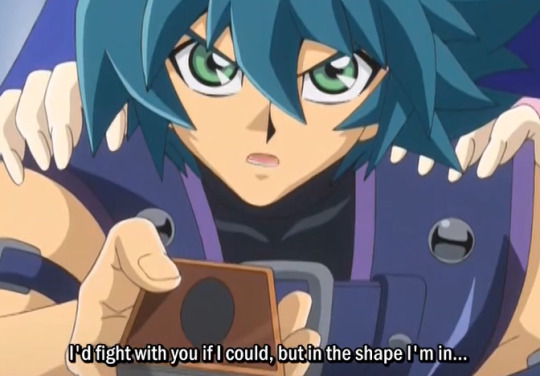
In Yu-Gi-Oh a duelists deck is often referred to as their soul, so Johan is entrusting Judai with a lot. That simple action really shows Judai that Johan can support him even from a distance and the two don't need to be attached at the hip.
In the tag duel against Fujiwara, Johan makes a similiar decision of sacrificing himself in order to protect Judai. However, to show how much he's changed since season 3, this time Judai does't completely lose his mind over Johan's sacrifice and respects Johan's feelings instead. Johan doesn't want Judai to fall apart, he wants Judai to carry his feelings with him and finish the duel for both of them and that's what he does. Judai has learned now to accept support without completely turning Johan into a crutch.
Citriniatis is also the third stage of alchemy. Each Season of the four seasos Yu-Gi-Oh Gx represents one of the four stages of alchemy.
The third stage is often referred to as the stage where the light which appears in albedo starts to shine.
Seperation from Johan essentially kicked off Judai's blackening stage, waking up his shadow in the form of the supreme king and bringing light to his flaws. This passage in particular describes it as a "rising sun" and "bringing light to consciousness."
In most cases Jung himself expressed the work as having three stages. Still, citrinitas seems to fit better into a flow of growth and development, as well as mystical progress as the third stage. In the second stage, albedo, a light appears in the nigredo darkness, the light of an awakened soul which is symbolised as a moon (the feminine) shining in the darkness. The third stage, citrinitas, brings forth the light of the sun (the masculine), a light which magically transforms the shadowy and fearful subconscious into valuable consciousness. From the dark night of rubedo, to the pale morning light of albedo, the sun rises in citrinitas to the culmination of day in rubedo. [Source]
Johan is simulatenously a light which shines on Judai's worst flaws just by being his better self and showing how selfish Judai is in comparison, while at the same time he's also the light that guides Judai on the path of healing.
After all Judai's final action in Season 3 isn't to kill Yubel like the Supreme King, or like a hero would, but rather to reconcile with Yubel. That's a path Johan would have taken considering Johan's whole goal is to help lost spirits like Yubel repair their relationships with humans.
Judai's journey of atonement even takes a similiar path to Johan, and mirrors Johan's dream of becoming the bridge between humans ad spirits. Unlike the duel between Cobra and Judai though, I don't think in this case it's Judai relying on Johan to give him the answers in life.
This is because the two of them have entirely different reasons for wanting to help spirits. Johan wants to help spirits because the strong connections he feels with spirits, and the crystal beasts in particular give him the only sense of family he's ever known. It's also because of an encounter with a little boy who lost his Jerry Beans Man where he came to understand that even people who can't see card spirits still feel a strog bond with them.
Judai however has an entirely different motivation, his journey to help duels spirits is a journey of atonement. It's also one he's taking together with Yubel because they both have a lot to make up for and a lot of healing to do.
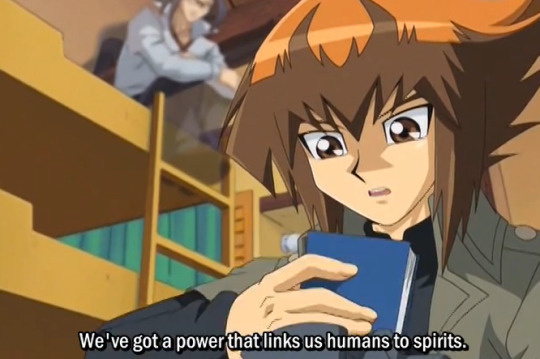
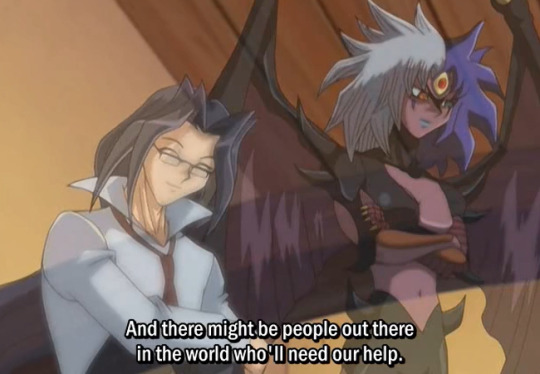
Judai also didn't start out Season 4 wantig to become the bridge between humans and spirits. In fact he spent most of season 4 sitting alone in his dorm being depressed and aimless. It's his confrontation with Fujiwara, and his act of helping Honest reunite with his spirit partner Fujiwara that gave Judai the idea that he could help heal other spirits too.
Following the motto of dissolve et coagula, dissolve and coagulate all the troubles and tribulations and even the separation of Season 3 was necessary for the much healthier bond between them in Season 4.
Judai doesn't even say goodbye to Johan at the end of the season, and he leaves without telling Johan where he's going, but essentially they are still walking the same path of uniting spirits and humans and it's a path Judai would have never found without Johan's help.
#ygo meta#johan andersen#judai yuki#yubel#yu gi oh gx#yu-gi-oh gx#yu gi oh analysis#spiritshipping#alchemy
36 notes
·
View notes
Text
Letter
I hesitated to write this post, i did say in another post that i decided to post it later (wow that’s a lot of “post” in the same sentence lol) so i can say that this has been sitting in my drafts since hours ago but i guess i’ll just post it anyways. As you can guess it’s about “Letter”
So as you may know, Jimin brought us a surprise which is a hidden track called “Letter” with JK doing background vocals (The Jikook subunit we never knew we’d get, well close enough i still see it as a subunit i don’t care sue me), thing is, i’ve seen some “theories” going around it about how “It’s a letter to us 🥺” or “It’s a Jikook song” and well.. I don’t agree with either one of those, why? i’ll tell you
Yes despite being a Jikooker i’m not a crazy cultist to come up with theories where i just stop seeing Jimin and JK as two individuals, we don’t do that in this house. So reason why i disagree is because this album is supposed to about Jimin all about himself, about facing himself, about growing out of a toxic past, leaving it behind and taking new fresh steps full of acceptance of who he truly is, he said it himself he didn’t want to have any collab because it wouldn’t make sense for someone else to sing about what HE feels.
Now “Letter” is supposed to come after “Like Crazy” English Version, well not really after it but it’s part of it, and i know that not everyone is smart enough to understand the message, many ignored the purpose of the album completely and the clear messages written ON THE ALBUM to interpret it but let me just rewrite it (i know damn well the homophobes will turn a blind eye to this) On Jimin’s album this is what’s written
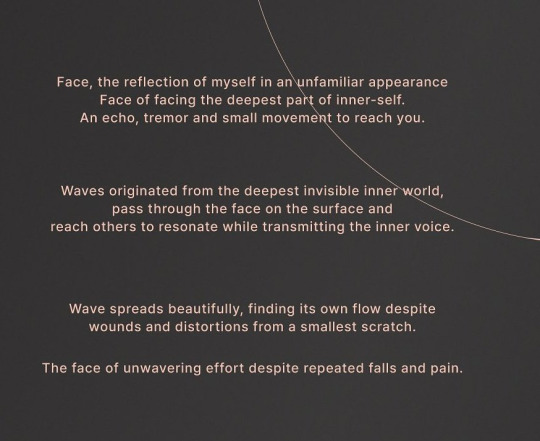
Key sentence : The reflection of myself in an unfamiliar appearance. Despite people freaking out about “OMG i thought they were going to kiss” “It’s a break up song and the girl is supposed to be his gf/ex-gf”
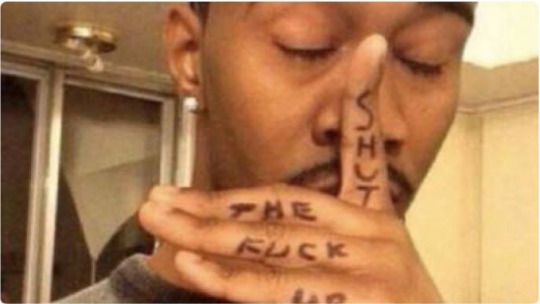
(Okay i know i’m now talking about Like Crazy while the initial post said i was going to talk about Letter but trust the process)
While Jimin did say that Like Crazy was based on the movie, it also wasn’t LITERALLY based on it, there’s this general idea, a story each can relate to it their own way and that’s what Jimin did, In an interview this was his reply
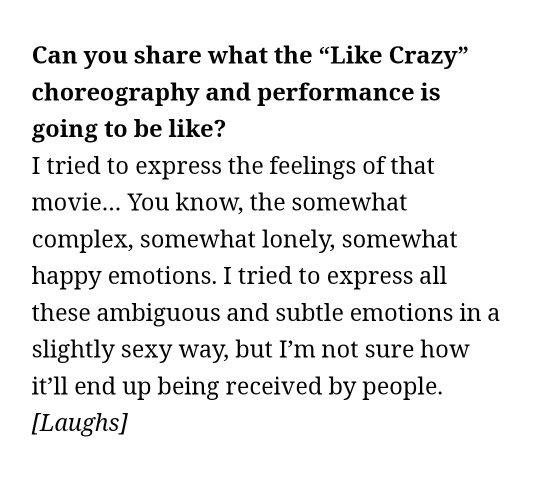
Key word : Ambiguous.
Jimin isn’t making an OST for the movie so why would anyone think he’s taking the literal story for his song? Going back to what he said about his reflection and the girl that made people go crazy without doing the minimum effort to understand, she basically represents Jimin himself, they walk towards each other but never collide because they are reflections
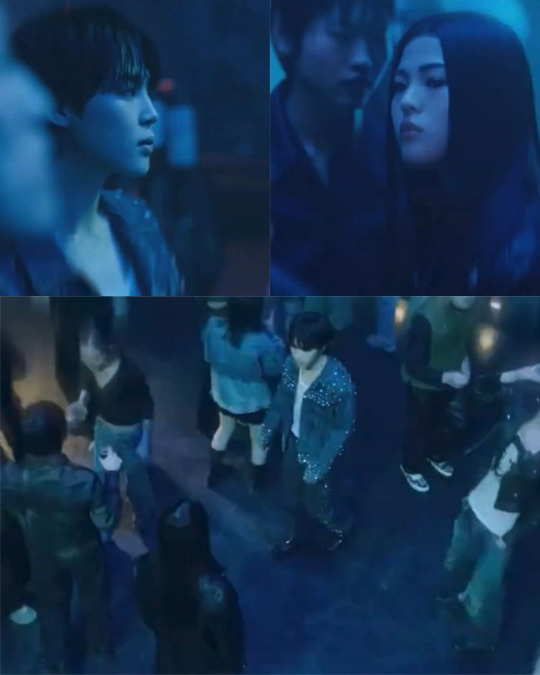
And to give you more insight about this, this is basically coming from “The Four Carl Jung Archetypes”. Carl Jung identified four main archetypes: the persona, the shadow, the anima or animus and the self. These are a result of collective, shared ancestral memories that may persist in art, literature and religion but aren’t obvious to the eye. These recurring themes help us understand the Jungian archetypes.These Jungian archetypes represent a journey from an unconscious state to individuation: a merging of the conscious and the unconscious.

What people also failed to notice is the very clear queer-code in the MV, from the colors, little details, clothings, etc.. As someone said on Twitter “This feels exactly like how my gay ass feels when i’m in a bar surrounded by straight people”. The outfit :
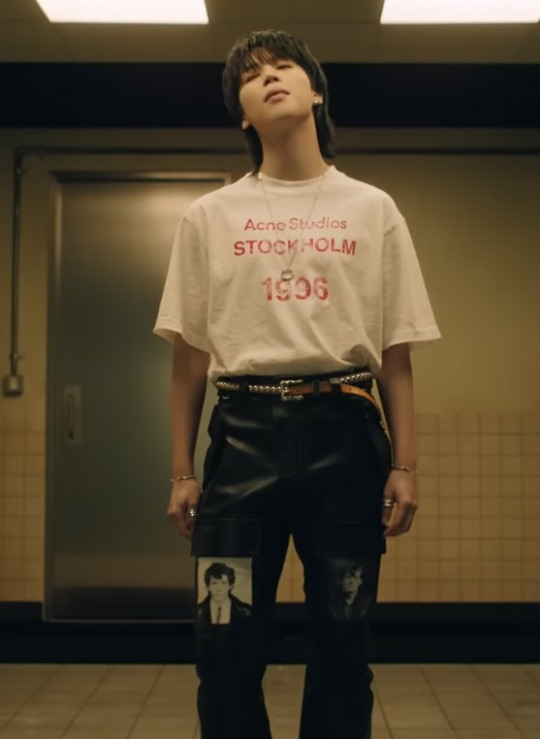
Which has Robet Michael Mapplethorpe in it
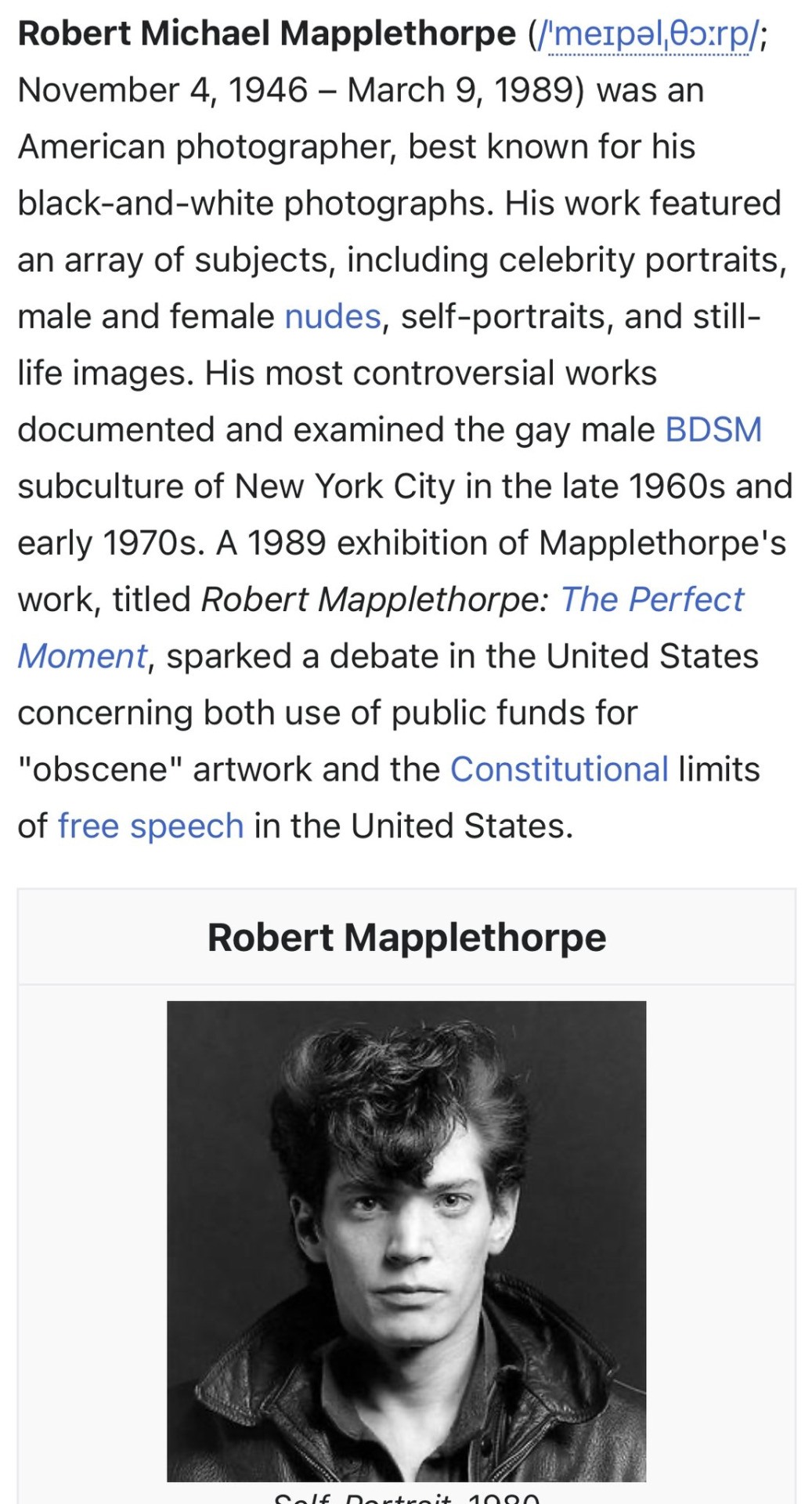

Now this one is my very own interpretation so take it with a grain of salt but this
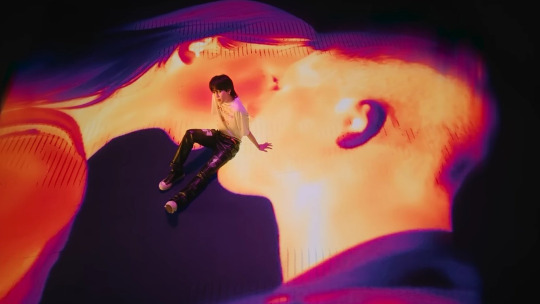
Personally to me, him sitting between a woman and a man kissing says a lot to me. It’s the fact that he’s in the middle.. I’m not going to further explain those who get it get it, those who don’t don’t. But that’s my own personal interpretation i’m just slipping it in here.
Now that this is out of the way let’s go back to “Letter” this whole talk about “Like Crazy” is mainly because to me Letter is related to it since very obviously both tracks are one technically speaking. So while people think it’s a letter to Army but i’m over here like “If it’s a letter to Army, why is it hidden? Why would they make it so that it’s only accessible to people who have the physical album? I thought the purpose of an Army dedicated song was for it to be OFFICIALLY out for all Army to listen to” because yes despite that being uploaded online by other Army but if we all decided to be petty and selfish af, this won’t see the light of the day on the internet and that defies the whole purpose of a song for Army.
As i said above this album is about himself, he’s talking about his own struggles so saying that this is an Army song as if Army are a struggle too is a bit.. And that also on his very first solo album where he’s supposed to focus on sharing a message about himself. When Hobi decided to dedicate a song to Army he didn’t put it in JITB it was a separate single, Joon didn’t have no Army dedicated song in Indigo either because again their solo Albums are about themselves, it’s a journey to share with us their individuality and their own colors. Jin didn’t have much of a choice he had to leave for MS there wasn’t enough time for an album or maybe he himself didn’t really feel the need to make an album and his main focus was to make a song for Army which he did and gifted us Astronaut. (GOD I MISS JIN)
The lyrics too, i as Army and as Jimin’s FAN, it didn’t feel directed to me. “Now I'll be the one to hold you, When you want to cry, So you won't trip and fall” or even “Because we don't know what days await us, Though it's scary, though we're afraid, Never forget that we're together” those feel like something related to himself as well, let’s also not forget that technically speaking it’s related to “Like Crazy” too which i explained above, why would anything Army related be scary? Why would we be afraid? What is there to be afraid of? Also how will Jimin hold us when we want to cry?
I also said that i disagree on the fact that it’s a “Jikook song” i don’t know how to explain precisely but some people seem to interpret it as THEIR song whereas even if Jimin is actually singing about his relationship with JK it’s still about his OWN feelings, his OWN promises, his OWN confession, despite JK doing the background vocals in which they harmonized so very beautifully kudos to them, i still think it’s all about Jimin, yes there might’ve been a reason why he chose JK himself for that or maybe they chose that together because really it could’ve been anyone and JK could’ve done the background vocal to any other song in the album yet it was on this one. He really did a lot of effort to open up to us so i really hope people see it as his pov on everything.
I made a post relating the song to There for You from GCFT and yes quite honestly to me it feels like a response to “I’ll be there for you but you gotta be there for me too” and yet again it still goes back to the same thing, it is Jimin’s OWN reply. I also noticed how Army songs didn’t have other members in them (well i mean Army songs in this solo era) so again why would this be an Army song if JK was in it? I don’t even know if all of this makes a lot of sense, can’t say i’m the best with words but i tried to convey how i see it.
Oh and let us be reminded that this was his reaction to knowing we found out about and and so cheesily saying that he won't tell us about it for now lol
Boy what are you all giggly and shy for?
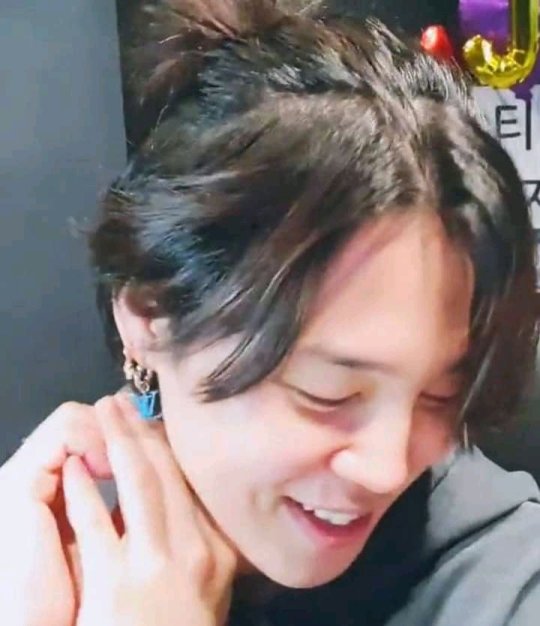
🧐
(Tagging this under Jikook because i don’t trust the rest of the fandom that much)
#jikook#Kookmin#minkook#mingukkie#park jimin you are so precious#jungkook i love you for the spoilers and thank you for beautifully harmonizing with boo
218 notes
·
View notes
Text
persona, shadow, and james herondale (aka i think i know what's going on with that guy in the midnight heir)
In Shadow Magic, Nikki Van De Car tells us that Carl Jung's persona archetype takes its name from the Latin word for mask. She explains that this is the face you present to the outside world: the initial outer shell of the matryoshka that is you. She writes, "From the time we were young children, we learned to embody our persona. [ . . . ] However, as with the shadow, if we aren't conscious of it, the persona can take over and cause us to lose sight of who we are beneath it."
For those unfamiliar with Jung's archetypes, the shadow is the regulating body of the unconscious, just as the ego is the steering wheel that drives our conscious, waking life, helps us decide what to prioritize and to eat for lunch and to wear to the gym, and when to call Kelsey (if you even should). Like our heart and lungs, our shadow operates mostly involuntarily on the things our ego doesn't register, or purposefully sets aside. Hence why "holding it in" when it comes to emotions is a bad idea. However, when the shadow isn't well integrated with the rest of yourself, one of two things happens: either the shadow takes over, or the persona does.
And this is exactly what happens to James Herondale.
Looking closely at silver bracelet enchantment and the way it acts upon James's mind, it doesn't actually make him fall in love with Grace. The actual purpose of the bracelet curse was twofold: it separated James's ego & persona from his shadow, and it placed Grace in control of all three. With his shadow, the part that wanted and felt and fought neatly out of the way, he was made vulnerable to brainwashing as he hadn't been before.
When people around James, like Matthew and Cordelia, speak of the Mask, when they're noticing is that James doesn't have a shadow any more. He barely has an ego. He's a papier-mâché of a polite, handsome young bookworm but there's nothing inside there. The shadow and to an extent the anima are particularly gutted. Grace then assumes for James the role of the other parts: she and her shadow regulate for James. No wonder he feels no desire for her, thinking it not in his nature, and they barely kiss: Grace feels no desire for him, and as her shadow regulated his, it kept him from acting on her and Tatiana's conscious command to want.
When the bracelet is taken from him or when, in Chain of Iron, it breaks, James's shadow comes flooding back. And, because James isn't used to having a shadow, because he has no experience of regulating such a thing, it takes over. And it goes after Cordelia. James's shadow remembers her when his persona does not and his shadow is, well, a shadow: it holds the reins of his emotions, of his subconscious, of his desires, of everything he's been forced to keep down for four, five years of his life. No wonder that when plunged into its grip all James can feel is want. Almost every "consuming shadow" moment we see in Chain of Gold and Chain of Iron are tinged with lust. But, with the Shadow still choking out all else, when faced with Grace at the end of Chain of Iron, all that's left of James is rage.
James's shadow talks a lot in Chain of Thorns and . . . it's not very nice, quite frankly. It's not nice in bed (he shoots a lock out, very nearly just takes Daisy on the stairs) and it's not nice in anger either. Shadows are rarely nice, but James's is particularly vicious. No wonder. He's never had a chance to sit with it, to hear it out, to integrate its beat and rhythm. His shadow has been neglected and that side of him isn't happy about it.
To be fair, "Chain of Shadows" would've made a too-apt alternate title for Chain of Thorns seeing as, well, that's what it is: from Matthew and Cordelia in Paris to Jesse on the rooftop and Anna in the catacombs, the book is full of everyone's shadows talking, and talking to each other. Arguably, however, Thomas's shadow talks most in Chain of Iron, on his midnight patrols.
Crucially, I think the persona/shadow theory of the bracelet could explain the phenomena known as "whatever the hell was going on with James in The Midnight Heir." Perhaps, when Grace attempts to call it off, she gives James's shadow back to him as well. What she means to do is give back his emotions, his ability to feel and love. There's no way Tatiana would've known how the bracelet actually works much less that she would have explained it to Grace, that's not Tatiana's way of being in the world. But if the function of the bracelet is to split the shadow from the ego & persona, it means he can only hold one or the other. James in TMH is Mr. Hyde. Unlike Chain of Thorns where he's trying and failing and learning to integrate all the parts of himself into a whole, James in The Midnight Heir is all shadow and absolutely none of the rest. His conscience, his ego, his values and morals are all taken away from him. He's vicious and feral and very nearly gets himself and several other people killed. Personally, it was a good thing Grace returns James's persona and takes his shadow back and chooses to wait for a time when she can take the bracelet off and end things completely: in removing his persona, she created a monster. I can only imagine her horror when she realized what she'd done.
Tl; dr: James Herondale plotline based in Jungian psychology. ChoG + ChoI James all persona and no shadow, TMH James all shadow and no persona, and ChoT is where he starts integrating them together. Can't confirm this is how Cassandra Clare's mind was working when she wrote it but the shoe sure as hell fits.
tiny tags: @emmalovesfitzloved @tleeaves @faithfromanewperspective @chaosandtwo @alastairstom and @quantummeep. also tagging @smartest-avenger because i happen to know you're a psychology enthusiast and i want your thoughts.
#james herondale#the last hours#the midnight heir#chain of gold#chain of iron#chain of thorns#jung's archetypes#shadow work#i feel like i have to be interpreting something incorrectly but oh well
18 notes
·
View notes
Note
I love all the analyses you've done. Especially Crosshair as I always found him to be a complex character.I would like to know your opinion of Crosshair in this third season and what did you think of him? Also his closeness to Hunter, since they've been talking they seem to be together all the time.
Now that I remember, I've seen fic where Hunter and Crosshair are described as lovers and it's funny because reading your analysis I remembered a story where Hunter gets drunk and gets involved with 2 Twi'leks and Crosshair upon seeing the mess on the boat angrily tells him he's not going to clean up his mess.And in other stories where they are together but are always fighting and arguing.Or in others where Tech and Crosshair do things on the sly and Hunter only tolerates Tech's because when it comes to Crosshair he reproaches them.I'm not saying they're canon or anything, but as written coincidences go, they're fun.
Thank you so much! Yes, Crosshair is a complex character, and I can't believe that I have written so much about him.
I am going to write an analysis of The Bad Batch season 3 after the series finale. Right now, I think Crosshair is on the right path as he is growing beyond his four main archetypes.
In "Shadows of Tantiss", once he takes a leap to escape Tantiss with Omega despite not knowing what's ahead clearly, he is starting to move beyond his Apollo archetype.
In "A Different Approach", Omega teaches Crosshair that violence does not always solve problems (something an Artemis person must learn, which is how to take down the Calydonian Boar). Of course, Crosshair does teach Omega to be more assertive and not let other people take advantage of her (a useful Artemis trait for a Persephone person like Omega).
As Crosshair reconciles with the Bad Batch, especially Hunter, he is "recycling" his Hera archetype, and this happens after "The Return" (winter has finally passed as Crosshair leaves the Outpost). Hunter defends Crosshair from Howzer, showing that he does care about Crosshair, which assures Crosshair's Hera archetype. When Crosshair talks about how loyalty should go two ways in "Extraction", it shows that he has grown beyond his Hera archetype - able to make wise decisions after getting out of an abusive relationship with the Empire.
In "Bad Territory", Crosshair learns meditation, which is a healthy method to deal with his emotional trauma. This helps him to move beyond his Poseidon archetype - channeling his destructive emotions through creative and calm methods.
Based on my analysis, Hunter has the Zeus archetype while Crosshair has the Hera archetype, which may explain why they are so close to each other (I do not do clone shipping). They support each other, yet they will argue with each other a lot. Those stories that you have mentioned do match this dynamic of theirs (and Tech with Hunter's favouritism).
They all may seem like "written coincidences", but I interpret it as archetypes existing in our collective unconscious. Carl Jung did travel to places in India and Africa where the people had never had western influences, and he found that many of their myths shared the same archetypal patterns as those western myths. He believed that archetypes are universal and they exist in our collective unconscious. Even though we may come from different places, have different cultures and have different experiences, the same patterns can be identified, taking on various forms, just as Joseph Campbell has stated in his book The Hero with a Thousand Faces.
I do believe these archetypes already existed in the Bad Batch, be it obvious or subtle. These archetypes are later expanded by the fans through various interpretations in the forms of headcanons, fanarts and fanfictions. They may not all be canon, but it's certainly fun to see. Besides, it helps me to explore human psychology and reaffirm Carl Jung's theory of the collective unconscious. Sometimes, by looking into how a person interprets the Bad Batch (along with what they like and don't like about them), I can figure out some interesting things about their personality, which leads me back to the archetypal patterns.
#the bad batch#tbb#star wars#archetypal psychology#archetypes#the bad batch analysis#tbb analysis#the bad batch season 3#tbb season 3#the bad batch spoilers#tbb spoilers#the bad batch crosshair#tbb crosshair
14 notes
·
View notes
Note
18, 19, and 9 if they haven't been done.
18. How many books did you buy? I actually got a bunch for free because I live in a college neighborhood, but I did buy a few used ones! Most recently, Pilgrim at Tinker's Creek- Annie Dillard, The Treasure of the City of Ladies- Christine De Pisan from a queer bookshop in Wisconsin, also Dreams and Four Archetypes- Carl C. Jung for cheap from a random student (I'm not a Jungian don't come at me), and my enormous Art of Noir book that I got online and got signed by Eddie Muller! I'm not counting textbooks that I couldn't find elsewhere.
19. Did you use your library? Unfortunately, I don't have a public library within walking distance so I am not even signed up for it. I do have a few little free libraries around my neighborhood and lots of students just giving away books.
9. Did you get into any new genres?- Not really-- (way too many Batman comics). I'm also listening to an excellent podcast tearing apart popular self-help and non-fiction "airport books". It's called If Books Could Kill, and I absolutely recommend it to everyone.
8 notes
·
View notes
Note
There's a (big) difference between the myers-briggs model and Jung's model? I saw it once somewhere. Someone was saying something like "the model that "we" use (guess they was talking about mbti) is different from the Jung's model (perhaps classic jungian or archetype (I don't know if they are the same thing, but I'm putting it because I had read some stuff saying that it was related to Jung))", and I want to know if these kinds of models are really different from each other (like the four letter from the big 5/sloan) or don't.
*I painted that words because when I was writing and rereading it was confusing for me, and then I change it, so I hope it makes sense for you
It makes sense, don’t worry.
It’s hard to pin down what people consider as “Jung’s model” and as “myers-briggs model”, because over these years the MBTI has been refined and has accepted new concepts such as loops and grips (all of these concepts are rooted in Jung’s Psychological Types book tho). Also, the original myers-brigss stack was IEEE and EIII, but now it’s IEIE and EIEI. The same problem arises with Jung’s model because post-jung analysts haven’t made a solid claim in the matter, and there are many different opinions out there that lack a solid theoretical corpus.
There are many undeniable differences between the MBTI model and the Jung’s model. Can we consider that both are different systems? Well, maybe. As well as we can consider that Naranjo and RHETI are two different Enneagram systems. The mess with the MBTI vs Classic Jungian approach is - of course – the function stack; but people also forget that the descriptions of the functions are super different, and that some of these definitions need a contemporary reformulation immediately.
Regarding the difference between both stacks, you can find on my tumblr a quick comparison and a defence of the Grant stack (MBTI).
The MBTI and the Classic Jungian are formally different because the MBTI model takes into account how multiple functions interact with each other in a person, and Jung’s model is more focused on the dominant function: for example, MBTI INFP is a 4 stack personality type FI-NE-SI-TE, Classic Jungian IF(N) is an introverted feeling personality type with secondary intuition.
The so-called “Jung’s model” is more rooted in jungian analysts than in Jung himself. Jung indeed talked about the existence of two auxiliary functions that were ment to help the dominant to access the inferior, but he never formulated a full typology out of his comments about it.
As a graphic example of the differences between MBTI, Classic Jungian and Jung, this is a scheme of what Jung understands as an ET type (an extraverted thinker).
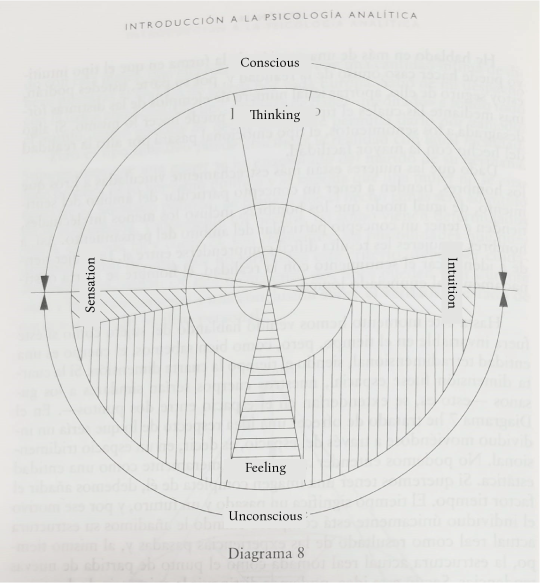
Source: Carl Jung, 1925. Notes of the Seminar on Analytical Psychology. XVI Session. Page 200. It’s in Spanish and I translated it, I don’t have the English version.
21 notes
·
View notes
Text
Jaune The Maid

Jaune alludes to Joan of Arc , who is famous for hearing the voices of the angels, for leading her people towards victory and for dying as a martyr.
So far, this allusion has not played a major role and its references have mostly been easter eggs in volume 1 throughout the Jaunidice's arc. However, I will argue that the set-up is here for it to be perfectly integrated into Jaune's arc. Not only that, but it can easily become the thematic heart of his story.
JAUNE- A JOURNEY THROUGH THE ANIMA
The anima is the archetype of the life itself. (“Archetypes of the Collective Unconscious,” Carl Jung)
According to Jung, the anima is "the inner feminine side of a man". I prefer to define it as one's "opposite self" aka an archetype made of traits we (think we) lack and so look for in a partner. In literature, the anima is used to develop romantic relationships. A character ends up with someone, who complements them and brings out qualities they initially haven't.
Whatever the definition you prefer, the idea of anima is the crux of Jaune's arc. He starts the series as a slave to toxic masculinity:
Jaune: I don’t want help! I don’t want to be the damsel in distress! I want to be the hero!
Still, thanks to Pyrrha's influence he moves past that and starts embracing his "feminine side" more:

This is Jaune's story in a nutshell. He is a boy, who wants to be a hero, but discovers that to become one, he must accept he is a damsel as well.
In general, the Vale arc sets up a gap between Pyrrha, Jaune and their approaches to heroism.
On the one hand Jaune wants to become a hero to run away from who he is:
Jaune: Cause this is always what I’ve wanted to be! My father, my grandfather, and his father before him were all warriors! They were all heroes! I wanted to be one, too. I was just never good enough.
This is why he symbolically enters Beacon through cheating. He acts as someone he is not.
On the other hand Pyrrha is a hero simply because that is the person she wants and chooses to be:
Red-Haired Woman: I don’t think she would regret her choice, because a Huntress would understand that there really wasn’t a choice to make. And a Huntress is what she always wanted to be.
The choice between being a hero and being herself is never really a choice because being a Huntress is a part of who Pyrrha is. So, her final sacrifice is not really a negation of the self, but a result of who she deep down is.
Since Beacon, Jaune has been struggling to overcome this gap by following into Pyrrha's footsteps.
He keeps integrating with her both physically:
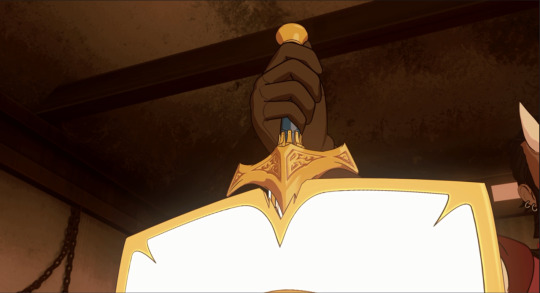
Blacksmith: That was some fine metal you brought me. Accents the white nicely. Where’d you get it from?
And spiritually:

Jaune: No. I don’t think I’m healing her. Our Aura heals our bodies. It feels… it feels more like I’m using my Aura to amplify hers!
Nora: Wait, aren’t you worried about running out?
Jaune: Pyrrha once told me I’ve got a lot of it. I still believe her.
This integration leads him to grow, but also forces him to fight the same foes (Cinder) and to face the same challenges and pain (killing Penny). In this way, Jaune is slowly becoming more like Pyrrha and he is acquiring the feminine traits he initially refuses. In other words, he is integrating with his own anima.
This process symbolically goes through 4 phases, known as the Four Stages of the Anima:
Jung distinguished four broad stages of the anima, analogous to levels of the Eros cult described in the late classical period. He personified them as Eve, Helen, Mary and Sophia. [“The Psychology of the Transference,” CW 16, par. 361. ]
Pyrrha is for Jaune the personification of 3 of these stages:
1-"In the first stage, Eve, the anima is indistinguishable from the personal mother. The man cannot function well without a close tie to a woman".
Jaune: Bring it on, Ice Queen! I'll have you know that I have been told that I am a natural born leader!
Weiss: By who? Your mother?
Jaune: A-and Pyrrha!
2-"In the second stage, personified in the historical figure of Helen of Troy, the anima is a collective and ideal sexual image" (“All is dross that is not Helen” – Marlowe).

3-"The third stage, Mary, manifests in religious feelings and a capacity for lasting relationships."
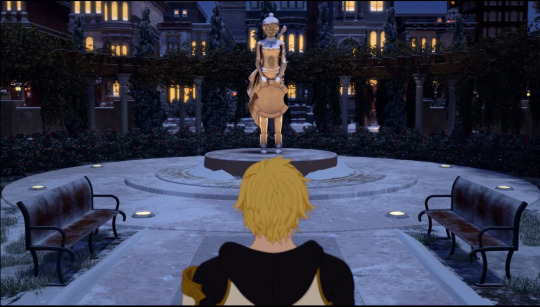
Some people fall in love for life
Others never get it right
Love's fickle when it calls
One thing that I know for sure
Longer than our lives endure
You're my forever fall
This means that even if she is dead, Pyrrha keeps being a key character for Jaune and a big part of his life:
Pyrrha: I want you to know that I’m just happy to be a part of your life. I’ll always be here for you, Jaune.
JAUNE'S ANGEL
Jaune: She should be standing here...
Red-Haired Woman: She is.
Pyrrha will always be at Jaune's side, even if just as an inner voice to guide him. After all, isn't Joan of Arc inspired in her quest by the voices of the angels?
Well, Pyrrha is Jaune's personal angel. Her sacrifice and example guide him throughout his journey. This is why the scene in Lost is so ethereal and yet needs no more elaboration.
Who is the Red Haired Woman? Is she Pyrrha's mother? Is she a manifestation of Pyrrha herself? Is she real? Is she a vision? It does not matter. Thematically, she is Jaune's inner self, that part of him who is forever bonded to Pyrrha (aka his anima :P). She appears to once again guide him and inspire him to be the best possible version of himself.
Pyrrha keeps living through Jaune, who is her legacy and this is why she keeps standing:
Nora: Pyrrha may not be by our side anymore, but we can fight like she is.
Jaune: And in a way... she will be.
4 DEATHS- 4 GIFTS
Pyrrha is Jaune's anima and his inner guide, but where exactly is she leading him? The answer is towards self-actualization. In RWBY this happens through the 4 gifts of the Gods:
Pyrrha: It’s not about why; it’s about knowing. Understanding dark and light helps us manifest our Aura. Everyone has some of both.
All the characters are going through Knowledge, Creation, Destruction and Choice in different ways. When it comes to Jaune, his journey is articulated through the 4 alchemical deaths:
Jaune’s arc is about living Pyrrha’s death over and over again with different scenarios and outcomes. This happens so that in the end he can finally overcome it.
So far, it has happened three times and each time has been in the climax of an important battle.
The Battle of Beacon has him witness powerlessly to Pyrrha’s death (lack of knowledge and passivity).
The Battle of Haven has him saving Weiss (creation).
The Battle of Atlas has him killing Penny (destruction).
What is more, every time Jaune becomes more proactive and conscious of what he is doing.
In Beacon he has no idea of what is happening. He works with little information and things happen to him without him being able to do anything.
In Haven his actions lead to Weiss being in danger, but he manages to save her. That said, he does not do it consciously. He unlocks his Semblance because of emotional stress. It is an unconscious choice and not a conscious one.
In Atlas he makes a specific conscious choice, but it is a choice that is forced on him because of external circumstances. It is also a choice that is meant to challenge and temporally break him.
Every death do far has symbolized one of the gifts. Pyrrha (Knowledge), Weiss (Creation), Penny (Destruction). By going through them he is painfully understanding the Cycle of Life Death and his role in it as well. This fits a character whose main motivation is grief and whose allusion is intertwined with the idea of martyrdom. Jaune is specifically the character that I think will deconstruct/invert this idea. Joan of Arc dies a martyr, while Jaune has to go through others' martyrdoms over and over. He must understand them, accept them and move forward despite the pain.
So, 3 gifts/deaths out and 1 to go. This last death has to be about Choice. Jaune's stance on it needs to convey he has understood the theme fully and that he is choosing who he wants to be. There is only 1 character that can challenge him to choose between Creation and Destruction and who has been a constant in all the climatic deaths so far:

Cinder is the perpetrator of each death and the one who has been hurting Jaune (and all the others) personally and cruelly. She is also the Maiden of Choice and if she wants her arc to have any kind of positive resolution she must fully understand this idea. Only in this way she can become fit enough to embody it.
However, as for now, she is far far far away from it. She has been ignoring her insecurities and pushing away any chance of positive development. So, can she still grow into a true Maiden? And how does Jaune figure in all of this?
MAIDENS AT HEART
Winter: No, Penny. You were always the real Maiden at heart.
Each arc has so far had 2 Maidens. The first is the titular Maiden, who can create tornados and has flaming eyes. The second is the Maiden at heart, who even without powers understands the theme and what being a Maiden truly means.
Raven and Yang are the 2 Maidens of Knowledge, while Winter and Penny are the 2 Maidens of Creation. Symbolically, they meet in front of a vault at the climax of an arc and the Maiden at heart shows the other who they should aim to become. What is more, usually this meeting calls back an early interaction between the 2 same characters.
Here it's what happens between Yang and Raven:
Yang: Oh, shut up!! You don't know the first thing about strength! You turn your back on people, you run away when things get too hard, you put others in harm's way instead of yourself!! You might be powerful, but that doesn't make you strong.
Raven: Who do you think you are, lecturing me?! Standing there, shaking like a scared little girl?!
Yang: Yeah, I'm scared. But I'm still standing here!
Here comes instead the Winter and Penny's interaction:
Winter: I was just a machine… just… following orders.
Penny: You were my friend.
Winter: Thank you… for trusting me with this. When you’re… gone…
Penny: I won’t be gone, I’ll be part of you.
Yang shows Raven what being strong and smart really looks like. She also proves to her that knowledge does not need to be a cage preventing you from doing the right thing. Their whole conversation in front of the vault also mirrors their previous interaction in the camp. There Raven tries to lecture and to teach Yang, while here she proves to her mother she is already a better person than her.
Penny assures Winter about her humanity and through her sacrifice she affirms the themes of friendship and trust. After having been cared and taught by Winter, she is finally paying the favor back, as shown by her repeating Winter's words about not really being gone verbatim.
So, what about Cinder and Choice? Obviously Cinder's Maiden at heart is Pyrrha.
CINDER AND PYRRHA'S FAILED COMMUNICATION
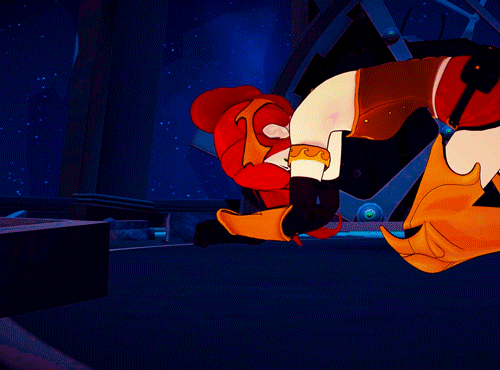
Pyrrha: Do you believe in destiny?
Cinder: Yes.
Like the other couples of Maidens, Cinder and Pyrrha meet during the climax of an arc and the Maiden at heart tries to teach the titular Maiden an important truth.
The problem is that Cinder kills Pyrrha before she can fully express what Choice and Destiny are really about. So, in a sense, here Pyrrha fails at communication. This is kind of the main struggle of her arc:
Pyrrha: Tell her exactly what you said. No ridiculous schemes, no pick-up lines. Just... be honest.
Jaune: But what if I-
Pyrrha: Jaune. You can't get it wrong if it's the truth.
Jaune: You're right. Thanks, Pyrrha! Good talk, Ren!
Nora: Practice what you preach, Pyrrha.
What goes in the way of her relationship with Jaune is on her part the inability to fully express what she feels. Moreover, Pyrrha's link to the idea of communication is shown also through 2 other details:
Her weapons - Milò (her spear) and Akuou (her shield) mean respectively to talk and to listen. One needs to both attack and defend to be a balanced fighter. Similarly, one needs to both talk and listen to be in a balanced relationship and to communicate effectively.
The setting of her fight with Cinder - Pyrrha and Cinder's fight happens on the top of Beacon Tower aka a Communication Tower. Pyrrha's sacrifice is born specifically by the necessity to stop the tower from falling, so that communication among countries can be maintained.
Pyrrha loses her weapons in the fight, just like the tower falls and world communication is lost. So, it is really not surprising that even her attempt to get through Cinder fails.
Cinder herself refuses to listen to others and symbolically she is once again the one who gets in the way of World Communication in volume 8, where she damages Amity and refuses Penny's attempt to understand her:
Penny: Why are you doing this? Why serve someone like Salem?
Cinder: I don’t serve anyone. And you wouldn’t either, if you weren't built that way.
So, Pyrrha doesn't manage to reveal her truth to Cinder, who on her part stubbornly keeps closing herself up to others. Still, before the end Cinder needs to learn Pyrrha's lesson.
Luckily, Pyrrha might have failed with Cinder, but her struggle to open up and to grow close to Jaune has resulted in her successfully passing on her teaching to him:
Pyrrha: Do you believe in destiny?
Jaune: Um... I-I don't know. I guess that depends on how you view it.
Pyrrha: When I think of destiny, I don't think of a predetermined fate you can't escape. But rather... some sort of final goal, something you work towards your entire life.
BECOMING A TRUE MAIDEN
To summarize, here is the situation:
Cinder still remembers Pyrrha's words, but she does not understand their meaning
Pyrrha has died apparently for nothing since she could not convey the truth to Cinder
Jaune needs to fully integrate with Pyrrha, his anima, so that he can reach self-actualization and become a true hero like her
There is a very simple way these plotlines and arcs can all come together and that is if Jaune himself becomes Cinder's Maiden at heart. He can be the one showing Cinder what Choice and Maidenhood truly are. It can happen in a scene that mirrors Cinder/Pyrrha, Cinder/Jaune and Pyrrha/Jaune's past interactions.
It would be a meaningful way for Cinder to finally become a true Maiden and to make a defining self-actualizing Choice. This choice will lead to Cinder's death (the 4th and final alchemical death), but will also save the world.
It would give additional meaning to Pyrrha's story by making her instrumental in saving the world, not because of her prowess as a fighter, but through her relationship with Jaune. In the end, her major contribution would be thanks to that young love which was cut short by her premature death and that nobody of the People in ChargeTM considered as important.
Finally, for the story to make Jaune symbolically a "Maiden" would be a fitting crowning moment for his arc. The childish boy who wanted to be a hero and a knight so badly finally realizes his dream... by turning into a sensible and wise Maiden. It would show clearly he has fully integratred with his feminine traits (Pyrrha, his anima) and would pay a neat homage to his allusion.
I mean, isn't Joan of Arc famous as the Maid of Orleans?
60 notes
·
View notes
Text

Dear god tumblr doesn't like horizontal posts
uuuuuuuuh click the image for better quality o~o"
For this assignment we had to use Carl Jung's 12 Character Archetypes and design a character based on one of the four quadrants: Freedom, Social, Order, and Ego
I decided to use some of my preexisting characters to see if I could assign an archetype to each one
(and I wanted an excuse to finally draw a proper lineup of these four in color)
Jella: Everyman
Vex: Ruler
Ilene: Creator
Odyssey: Rebel
I will say it was pretty difficult trying to give each one a pose to make their assigned archetype semi-clear as you could easily mistake Jella for the Jester or Vex as the Rebel based on clothing alone. On top of that, the last three characters could all easily fit under the Rebel archetype due to their personalities and the fact that they've committed some kind of crime or felony. Ultimately I went with the logic that everyone fits into a different archetype depending on the group they're in since real people aren't defined as one single category. For example, Odyssey here is the Rebel but on her own she could be the Explorer and she can also switch to being the Jester when she's being more casual and nonchalant.
#jester#jester girl#vampire#vampire girl#illusionist#chimera#monster#character design#character concept#character lineup#archetypes#character archetypes#12 archetypes#art class
4 notes
·
View notes
Text
RWBY as Jungian Archetypes
In which Hamliet and @aspoonofsugar discuss RWBY volume 9 teaser, and also alchemy, and also Jung.
I’ve also talked about Jung’s work in creating literary alchemical criticism. Each of the four stages--Black, White, Yellow, and Red--correspond to a Jungian archetype, and RWBY’s central four embody these respective archetypes in their arcs.
But wait: What exactly is a Jungian archetype?
Well, Carl Jung’s whole theory--which, as I’ve said ad nauseum, is better applied to patterns in storytelling than to real-life psychology--is that there is something called the collective unconscious. You might think of the collective archetypes as somewhat universal images, themes, and moments that we as human beings recognize and respond to in a similar fashion. Archetypes are specific aspects of character, and Jung hypothesized that people confronted different archetypes in their overall journey of individuation. Individuation is the end goal of Jungian stories--to be fully developed as yourself, confident in who you are, aware of your flaws and your strengths.
So, the tl;dr is, insofar as analyzing stories goes:
Collective unconscious: universal tropes that largely resonate with people no matter their culture. Part of the collective unconscious is:
Archetypes: part of a character (usually personified as another character). Archetypes in turn must be faced by each protagonist in order for the protagonist to achieve:
Individuation: the end goal of being fully realized as your own person.
But wait: there’s one more important thing to note. To quote Jung:
all archetypes spontaneously develop favourable and unfavourable, light and dark, good and bad effects.
In other words, there’s a yin/yang to each archetype. I’m not being facetious here; Jung drew on yin and yang (which are linked to Chinese alchemy). In alchemy and in Jung, you can’t have one without the other. The entire premise of alchemy is steeped in the idea of yin/yang, of reconciling opposites, of uniting that which should repel each other.
Blake: The Shadow

The first stage in alchemy is nigredo, or the Blackening. In terms of archetypes, it is associated with the Shadow. The Shadow is all one’s negative traits, the parts of ourselves we’d rather not acknowledge. But the more you run from it, the more your Shadow grows. The only way to grow is to accept your Shadow. Jung writes that confronting the Shadow is:
...the first test of courage on the inner way, a test sufficient to frighten off most people, for the meeting with ourselves belongs to the more unpleasant things that can be avoided so long as we can project everything negative into the environment.... The shadow is a living part of the personality and therefore wants to live with it in some form. It cannot be argued out of existence or rationalized into harmlessness. This problem is exceedingly difficult, because it not only challenges the whole man, but reminds him at the same time of his helplessness and ineffectuality.
If this sounds like Blake’s arc, in particular her struggles after leaving the White Fang and then after leaving RWY, it’s because it is. (Blake’s semblance is even called “Shadow” because Crwby is extra.) She’s struggling to accept her past, to accept her cowardly side, to accept that she can be a loving person. These are all very realistic abuse responses, and this can also be part of the Shadow.
Sugar-chan has spoken at length about Blake’s arc here and here. Blake is also light, though. “Blake” can also mean “white,” showing that Blake can be both. Lyndy Abraham writes that:
the shadow is not something separate from light, but rather integral to it.
Blake needs to reconcile her shadow, integrate with it, to be able to grow.
Weiss: The Anima/Animus
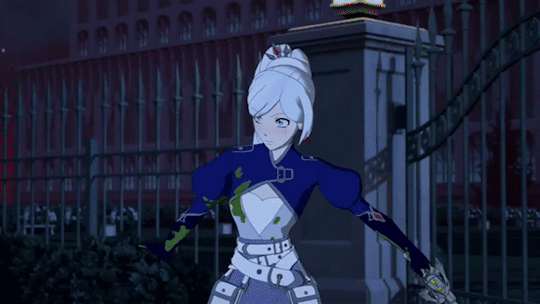
Weiss Schnee represents Albedo, or the Whitening. Jung links this stage to the anima/animus. Which is interesting, because I once wrote a whole meta on Jaune’s arc (heh) in which I pointed to how Pyrrha is his anima, but that the final stage of the anima will likely be embodied by Weiss.
So, what is anima?
Anima (which means ‘soul’ and yes has been literally referenced in the show in that it is the name of a continent) is the internal feminine part of a man’s soul (animus is the male for a female). Don’t take the gender stuff too literally please I’m begging.
But, the gender stuff can be interesting when we consider how both Weiss and Jaune straddle the gender divide: both are both knight and princess in need of rescuing. Sugar wrote a bit more about Weiss’s arc here, Weiss rescues herself. She’s the knight with the sword, and her semblance, Glyphs, include a giant knight. Jaune is of course modeled after Joan of Arc, a female historical figure, and within the show comes to the dance dressed in a princess wedding gown, and has a gift for healing (the wounded healer is another Jungian archetype, and is often female).

We only saw one glimpse of Jaune in the trailer, but he was Not Doing Great. Considering his sword broke after he was forced to kill Penny, this makes sense. Jaune is actually more directly associated with the rainbow “phase” (flash phase between black and white), but his first name is French for yellow, and so it makes sense for him to reach his final development in the Yellow Phase, which we’re in now. Also of note from Jung:
Because the anima wants life, she wants both good and bad.... The anima believes in ... the ‘beautiful and the good,’ a primitive conception that antedates the discovery of the conflict between aesthetics and morals... the good is not always the beautiful and the beautiful not necessarily good... The relation with the anima is again a test of courage, an ordeal by fire for the spiritual and moral forces of man.
If this doesn’t sound like exactly what Jaune’s struggle post-killing Penny will be, then I’ll eat my hat. Also note the fire reference.
In my previous meta on Jaune, I wrote this about the final “stage” of anima integration in development:
Wisdom, of course, being the Sophia stage, which he’ll continue to grow into as he accepts more and more of his anima. There is a chance–and this is just a theory and does not have to be romantic–that Weiss might be the embodiment of Sophia in the story (“Weiss” is German for white, and German for wisdom is “weisheit”; they have the same root word (Old German wis); wisdom is traditionally associated with white in not just alchemy, but pretty much every source of symbolism, and is often portrayed as a beautiful woman). Also, Weiss admired Pyrrha deeply at first, and wanted to be Pyrrha’s partner, and Weiss is the only other person in the void who saw what happened to Penny. So, Weiss becoming more and more like Pyrrha might help Jaune integrate with Pyrrha as his anima, and may provide some much-needed perspective on what happened with Penny.
I don’t mean to suggest that Weiss’s arc is actually as a piece in Jaune’s, because lord above no. But Weiss instead serves as an embodiment of wisdom for her peers--all of them. She is also the only one who saw what happened with Penny, and probably will have to break the news to RBY. She dispenses knowledge and guidance, inspiring Winter, Whitley, even Willow.
What’s the dark side of anima/animus? Well, it’s actually over-identification with the anima/animus (so basically, Pyrrha for Jaune). Jung writes that the anima/animus would then take over “the self, with which the patient's animus identifies. This identification is a regular occurrence when the shadow, the dark side, has not been sufficiently realized.” Weiss has faced this very challenge throughout her arc: does she want to be defined as herself, or as a Schnee (aka her father)?
Yang: The Wise Old Man/Woman

Yang represents Citrinitas, or the Yellowing. This phase is linked to the Wise Old Man/Woman archetpe.
This might seem a stretch at first. How is young, fierce Yang, known for her impetuousness, a wise old man/woman? Well... as Sugar-chan has written, Yang is linked to Knowledge as a theme (she is the one who gets the lamp). In addition, in Jungian terms, confronting/integrating this archetype means reconciling with both positive and negative parental figures. Y’know. Kinda what a major motif in Yang’s arc is.
Not only that, but Jung connects this citrinitas phase to the “mana” personality--the part at which someone begins contemplating existential questions like “why am I here?” and other such theoretical questions (right before proceeding onwards to individuation and a fully realized self). Considering we’re literally in another world at the start of volume 9 and the questions from the trailer were all precisely of this nature, well. I’d say we have some Yang development to finish.
But as mentioned earlier, there is no archetype without its opposite. What on earth could be the opposite to the Wise Old Man and Woman? Jung specifically identified it as a dark mother figure or a witch. Yep. In fact, Jung’s Archetypes even recounts a fairy tale when discussing this archetype in which he writes that:
The hunter or old magician and the witch correspond to the negative parental imagos in the magic world of the unconscious. The hunter first appears in the story as a black raven.
Well, well. Sound familiar? What if I addd that tin the same work, Jung calls the witch the “terrible mother?”

Not only that, but Archetypes contains another elaborate description of the old man/woman archetype and specifically relates it to the concept of... bears (and Yang is based on Goldilocks):
we have a maternally protective goddess related to bears, a kind of Diana or the Gallo-Roman Dea Artio. The sky-woman is the positive, the bear the negative aspect of the “supraordinate personality,” which extends the conscious human being upwards into the celestial and downwards into the animal regions
In other words, my guess is Summer is the positive sky-woman, and the bear is Raven. My guess is there will be a final confrontation with Raven as they’re determining things about Summer.
Sugar-chan also noted to me that it’s possible we’ll see the contrast between Yang as a mother figure herself, and as an inner child (another Jungian archetype):

The wise man a good key to read her arc is actually child/mother. She acts as Ruby's big sis bit is also the baby bear.
Ruby: The Self

With the “Self” archetype representing having actually reached individuation, the Self doesn’t have a personification as another character. Instead, the symbol of the Self is more accurately a mandala, or, the circular symbol that appears constantly in RWBY. And of course, one of the final symbols of the philosopher’s stone is the red rose.
There’s not a ton to say about this just yet, because Ruby’s arc is mostly set-up at this point. But with the drop of the volume 9 teaser, that looks likely to change... because all these questions Ruby is asked? Are about the Self.
Mouse: What are you?
Ruby: Oh, uh, I’m a human. A girl? A Huntress,
Mouse: That’s a lot of things.
Ruby: I’m... Ruby Rose.
Mouse: And to Ruby Rose is your purpose?
Ruby: No, no, that’s my name.
I think this is clearly setting up the core of Ruby’s conflict: who is she? And who does she want to be? To an extent, it’s the question at the core of all RWBY’s arc.
But these questions aren’t just about Ruby. They’re also a likely reference to The Little Prince, a work fans have been associating with Oscar. This is a scene from The Little Prince:
"Good morning," he said courteously.
"Good morning−−Good morning−−Good morning," answered the echo.
"Who are you?" said the little prince.
"Who are you−−Who are you−−Who are you?" answered the echo.
"Be my friends. I am all alone," he said.
"I am all alone−−all alone−−all alone," answered the echo.
Seems a little similar to clip of Ruby trying to find her way through Wonderland, with the bird echoing over and over and her actually making no progress no matter how fast she walks.

Plus, well:
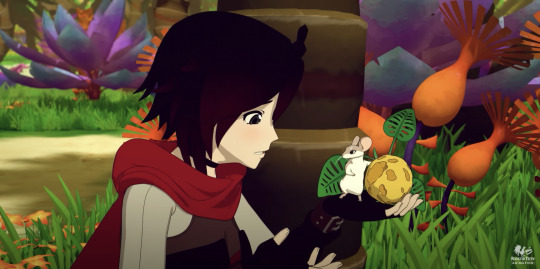
Mouse: What’s wrong?
Ruby: Have you seen other people--humans--like me?
Mouse: Exactly like you?
Ruby: No, not exactly like me. We’re similar, but different.
The Little Prince:
"Good morning," said the roses.
The little prince gazed at them. They all looked like his flower. "Who are you?" he demanded, thunderstruck.
"We are roses," the roses said.
And he was overcome with sadness. His flower had told him that she was the only one of her kind in all the universe. And here were five thousand of them, all alike, in one single garden! ... Then he went on with his reflections: "I thought that I was rich, with a flower that was unique in all the world; and all I had was a common rose."
What exactly this means for Ruby, I’m not sure. Ruby seems to already be aware that she isn’t the only one like her, so that’s unlikely to be her struggle. I am curious as to how Ruby’s identity--and perhaps her overidentification with her mother, another very Jungian concept--will be explored. My guess is, even though Summer is a positive influence, Ruby will avoid the same fate by making a choice different than Summer’s (this would not be to condemn sSummer’s choice, but instead be a sign that Summer is still teaching Ruby even though she’s deceased).
#rwby meta#rwby volume 9#rwby vol 9 teaser#ruby rose#summer rose#rwby theory#alchemy#yang xiao long#raven branwen#weiss schnee#jaune arc#white knight#blake belladonna#Jung#oscar pine
52 notes
·
View notes
Text
Good Sunshine beautiful people!! i’ve created a blog where i discuss and write various articles on different subjects and times in my life. later today i will be posting one about shadow work because the psyche is a self regulating system and it is important to maintain balance in every aspect of your life! i will also be discussing Carl Jungs four archetypes and how they play a role in shadow work, if you’re interested please follow my other account @daughtersimage.
Bless
8 notes
·
View notes
Text
What Azula's halucination of her mother tells us about her personality

(This was originally posted in the review section of the ATLA fanfiction Dominion by Aurelia Le. The text has been altered such so that any Dominion related stuff was either omitted or put in parantheses "[...]".)
Alright! Let's talk about Azula's halucinations.
Schizophrenia is a very interesting mental illness. [And clearly Azula in Dominion suffers from it, since her halucinations are consistent and haven't disappeard in four years!]
In order to understand the deeper meaning of her delusions, we have to understand what a so called 'archetype' is. The famous psychologist Carl G. Jung had a preculiar interest in schizophrenic people and studied them well. He looked into them and tried to understand, what their halucinations could tell about them. He observed all kind of different schizophrenic people from all over the world with different backgrounds, cultures and ethnicities and he would soon find, that there were patterns emerging.
Carl Jung would start categorizing all the different types of halucinations and would call them 'archetypes'. He just had discovered the ancient and deeply rooted mechanics of the human psyche. Turns out, what we call personality is not one whole thing, but rather a set of different subpersonalities each having different agendas. The halucinations and delusions of schizophrenics are real in the sense, that they represent the different archetypes residing deep within them. As opposed to non-schizophrenics, the subpersonalities of schizophrenics sip out of their unconscious and thus become a part of their conscious realm. Which means, that one advantage of having schizophrenia is, that one has deeper knowledge about those subpersonalities and their agendas. And those agendas can sometimes be very fucking scary ass shit!
[We already talked about two of the subpersonalities like the Shadow and the Anima/Animus. Those are archetypes!]
Let's use Azula as an example! Azula in the show is clearly possessed by the Nurtering Mother archetype. Clearly evident of her halucination of Ursa. Not because it has the shape of her real mother, but rather because of the way it presents itself as kind and loving, but also ready to point out genuine mistakes Azula did. Essentially saying: "You made some mistakes. But that's okay. I still love you!" And people were quick to believe, that this was the way Ursa really was behaving towards Azula. But that's not necessarily true! Remember, this is a subpersonality of Azula's and NOT the real Ursa. One could maybe argue, that it actually could be the Devouring Mother archetype, but personally I think that's a stretch and not the case.
So Azula is possessed by the Nurturing Mother archetype.
...
Let me say this again... Azula is possessed... BY THE FUCKING NURTURING MOTHER OF ALL FUCKING THINGS!
And this is canon! There is no disputing this!
Which means... against all expectations... Azula will most likely be a good mother! It's just baffling!
[In Dominion, when Azula finally meets Ursa, the Nurturing Mother disappears, so it appears. But in reality, with the company of her highly vulnerable mother and her pregnancy progressing she slowly BECOMES the Nurtering Mother. She is no longer fighting her motherly instincts (ironically by taking care of her mother), and more or less successfully integrates that archetype in her life. So it becomes dorment in her consciousness.]
[But here is the thing... In Dominion, Azula becomes also possessed by another archetype. Because by starting to listen to the Nurturing Mother, she also started repressing other subpersonalities of hers. I'm talking about the Tyrannical Father/King archetype. And sure enough, we get to see her being haunted by Ozai in chapter 28. For now she only hears his voice, but if she can't assert herself in the world soon, this voice will only grow in resentment and mutate into something her psyche will not be able to ignore. You do NOT repress an archetype. If you do, it will only strike back with vengeance! Instead, you feed it small bits once in a while and keep it in check, so it doesn't possess you.]
I think, what the most ideal situation for Azula is, is an environment, where she can satisfy both archetypes. After conquering Ba Sing Se, that was exactly, where she was. Surrounded by friends and family with enormous high political power. [I'm curious, how Dominion will handle her destructive tendencies. How she'll find a way to tame her Tyrannical King...]
10 notes
·
View notes
Text
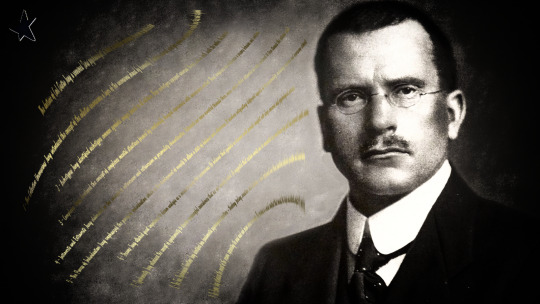
The doctrine of Carl Gustav Jung
The doctrine of Carl Gustav Jung, a renowned Swiss psychoanalyst, is known as analytical psychology. Here are some key points of his doctrine:
1 - The Collective Unconscious: Jung introduced the concept of the collective unconscious, a layer of the unconscious shared by humanity. It contains universal archetypes, symbols, and motifs found in myths, fairy tales, and religions.
2 - Archetypes: Jung identified archetypes, common symbolic images found in all cultures. These archetypes represent universal themes such as birth, death, the mother, the hero, etc.
3 - Complexes: Jung developed the concept of complexes, mental structures formed by emotionally charged experiences with unconscious content. These complexes can influence a person's behavior and reactions.
4 - Introverts and Extraverts: Jung elaborated on the concepts of introversion and extraversion as personality characteristics. Introverts are more oriented towards their inner world, while extraverts are more inclined to turn towards the external world.
5 - The Process of Individuation: Jung emphasized the process of individuation, which is the development of oneself to attain a state of balance and wholeness. It involves integrating different aspects of the personality, including conscious and unconscious elements.
6 - Dreams: Jung attached great importance to dream analysis as a means to access the unconscious. He believed that symbols in dreams could provide insight into deep concerns and psychological processes.
7 - Synchronicity: Jung introduced the concept of synchronicity to describe meaningful coincidences that are not causally linked. He suggested that certain events can be connected in a non-linear way and have personal or symbolic meaning.
8 - The Four Psychological Functions: Jung identified four fundamental psychological functions – thinking, feeling, sensation, and intuition – and explained how these functions influence perception and decision-making.
9 - The Persona: Jung introduced the concept of the "persona," representing the social mask each person wears in society. The persona is a social construct that conceals the deeper and authentic aspects of the personality.
Picture of CGJ
illustration by Laurent Guidali
Www.Etoile.App
0 notes
Link
[paypal_donation_button border=”5″] Carl Jung Depth Psychology Facebook Group Four Archetypes: Mother, Rebirth, Spirit, Trickster (Routledge Classics) The Mother Archetype: Like any other archetype, the mother archetype appears under an almost infinite variety of aspects. I mention here only some of the more characteristic. First in importance are the personal mother and grandmother, stepmother and mother-in-law; […]
0 notes
Video
youtube
Liked on YouTube: Why Are People Trans? || https://www.youtube.com/watch?v=fadSfCyQCjQ || The first 1,000 people to use my link will get a 1 month free trial of Skillshare: https://ift.tt/aWJyZ9d For 30 years, scientists have searched for a biological cause of trans identity... and haven't found much. Why do we want to find a cause, anyway – and how do we handle the questions science can’t answer? Support the channel on Patreon: https://ift.tt/0PGxiOr Twitter: https://twitter.com/lily_lxndr Instagram: https://ift.tt/sxZnuvr Letterboxd: https://ift.tt/j6ypw2I – Sources: (Why are people trans?) Ultrasounds & sex-selective abortion https://ift.tt/dJ29vUG Mara Hvistendahl, "Unnatural Selection: Choosing Boys Over Girls, and the Consequences of a World Full of Men" India's ban on sex screening https://ift.tt/ILtgubH China's ban on sex screening https://ift.tt/RNO0jxC (What we're really asking) Laura Erickson-Schroth, "Update on the Biology of Transgender Identity" Rachel N. Levin & Laura Erickson-Schroth, "Biological studies of transgender identity: A critical review" Milton Diamond, "Transsexuality Among Twins: Identity Concordance, Transition, Rearing, and Orientation" Leslie Feinberg, "Transgender Liberation: A Movement Whose Time Has Come" https://ift.tt/XCkxl6H Zhaawano Giizhik on Ojibwe Two-Spirit history and identity (excellent page!) https://ift.tt/3CBs5Po (Creation myths) T. L. Brink, Victoria Karalun, "Narratives: The Focus of 21st Century Psychology" Jerome Bruner, "Actual Minds, Possible Worlds" Richard Harries, "After the Evil: Christianity and Judaism in the Shadow of the Holocaust", pgs 38-47 Kalonymus ben Kalonymus ben Meir, "Prayer for Transformation" (excerpt from "Even Bohan") https://ift.tt/ZwoVsL3 Rachel Pollack, "Archetypal Transsexuality" (READ THIS!!) https://ift.tt/inYxmh5 – Further reading/viewing: My video on Kentucky Route Zero and objective truth https://youtu.be/0dPrf1y2CAo Andrei Tarkovsky's movies "Solaris" and "Stalker" Mao Zedong, "On Contradiction" https://ift.tt/sgbuXIr Carl Jung, "Commentary on 'The Secret of the Golden Flower'" Aristotle's "four causes" https://ift.tt/io6VSxj – Table of contents: 0:00 Gone, it's gone forever 1:09 Why are people trans? 6:43 What we're really asking 14:52 Creation myths 23:18 On trans divinity 26:47 Skillshare 27:47 Credits
0 notes